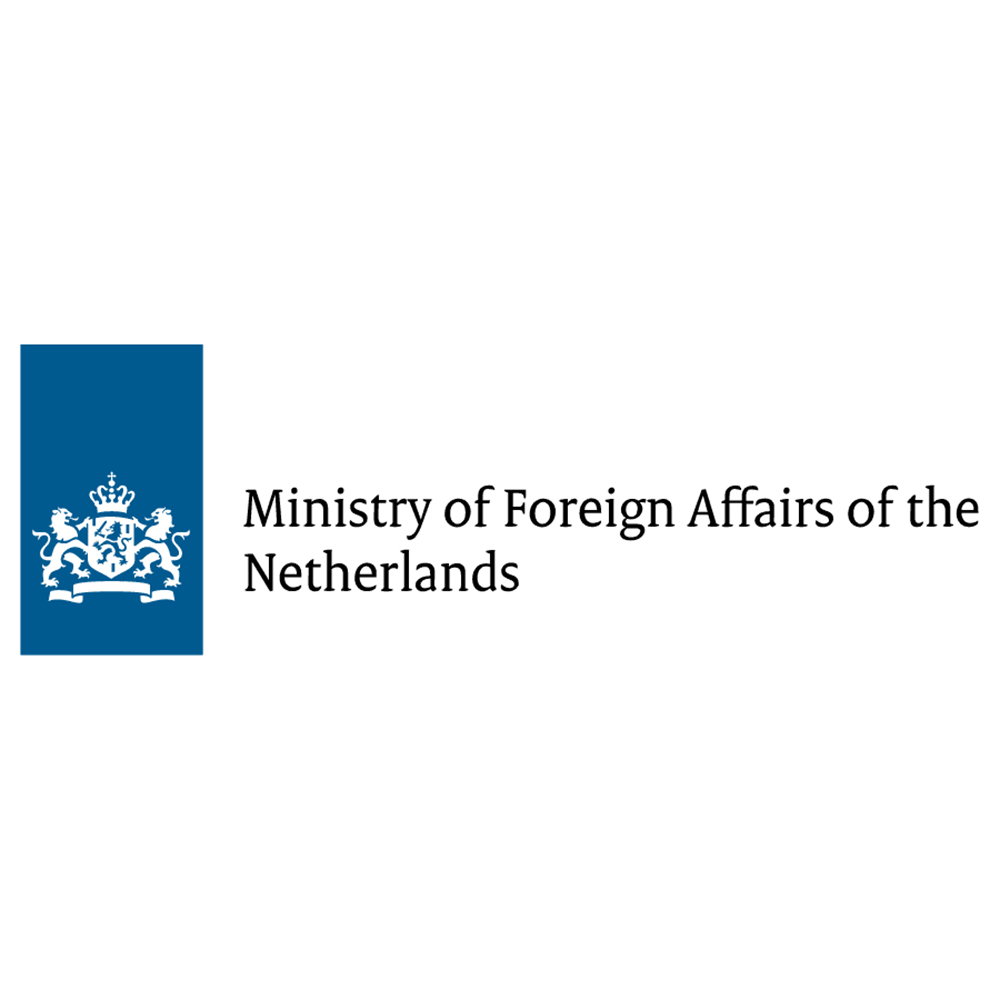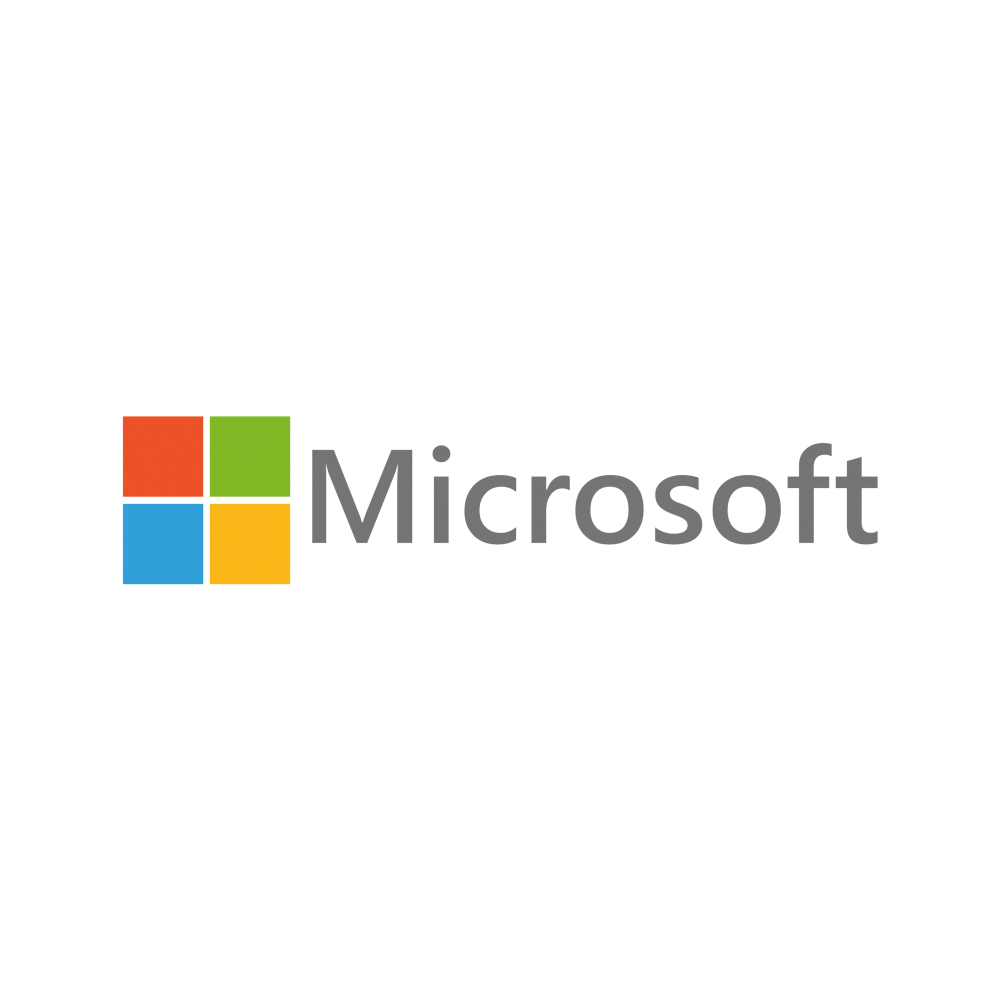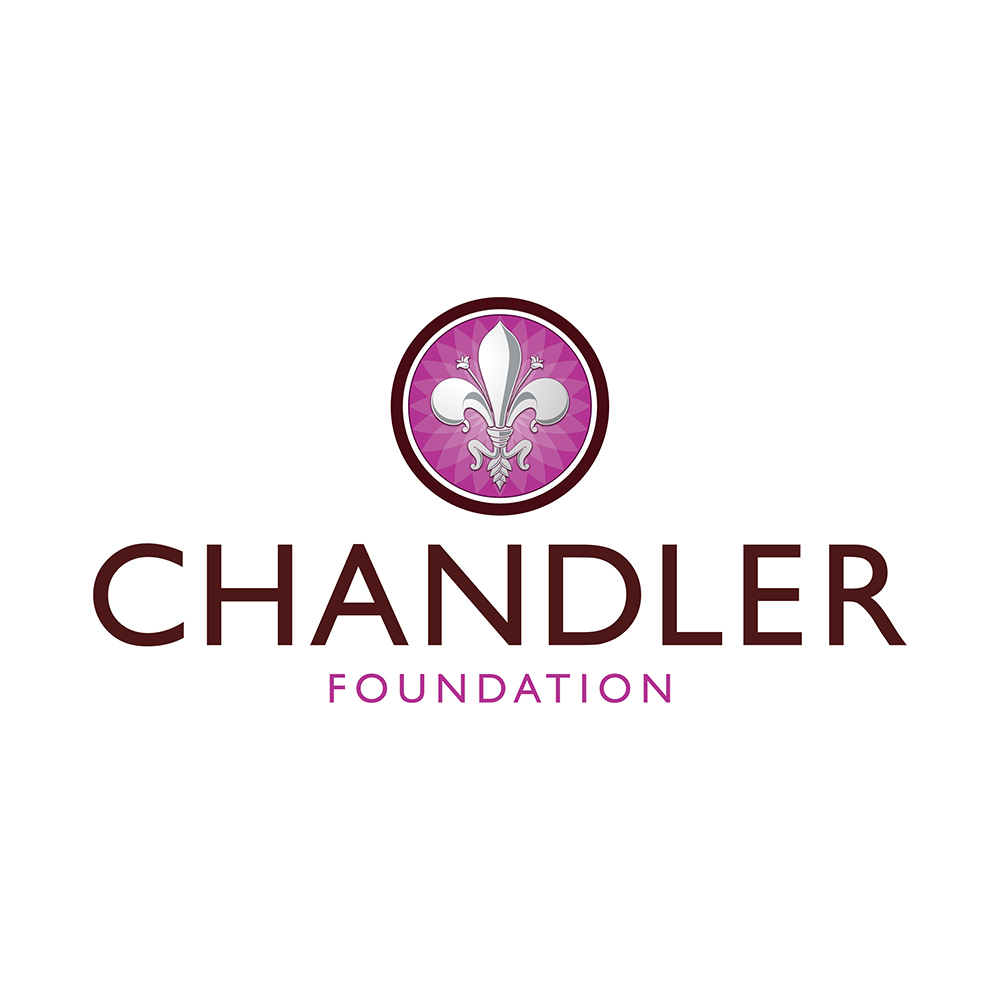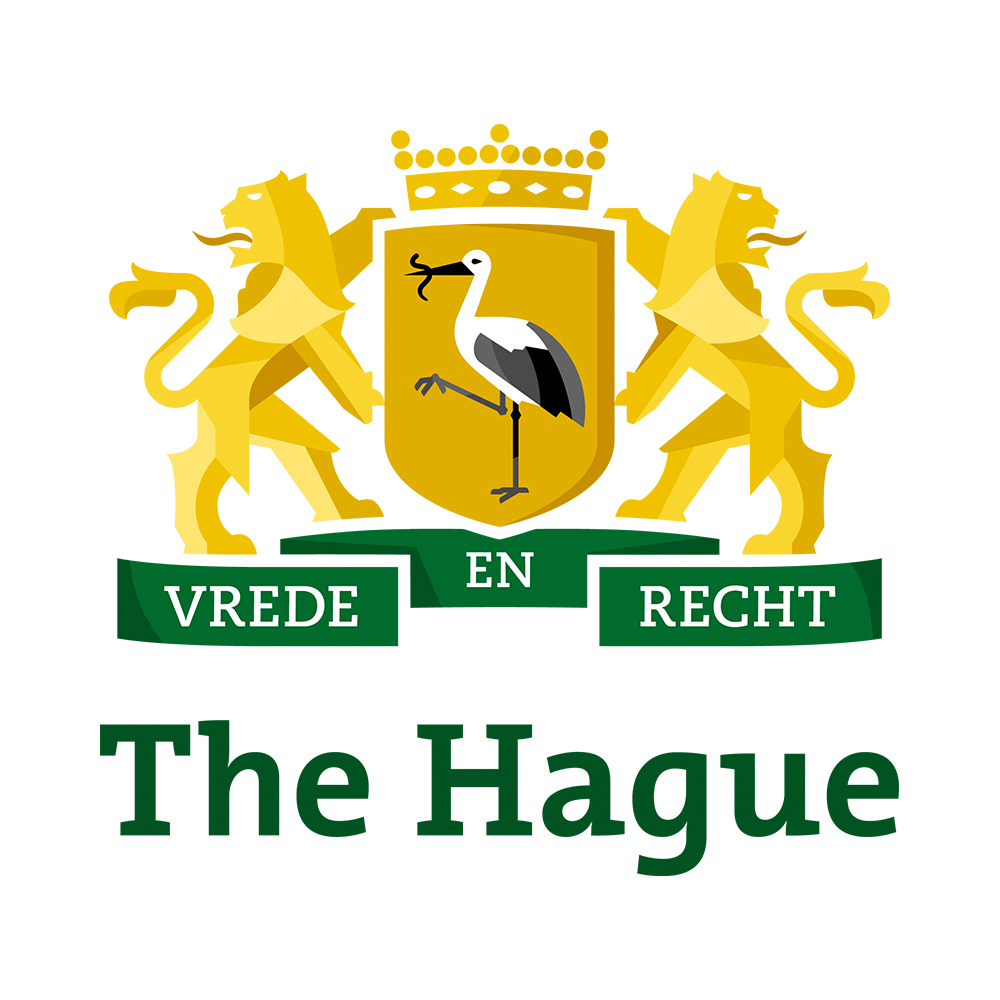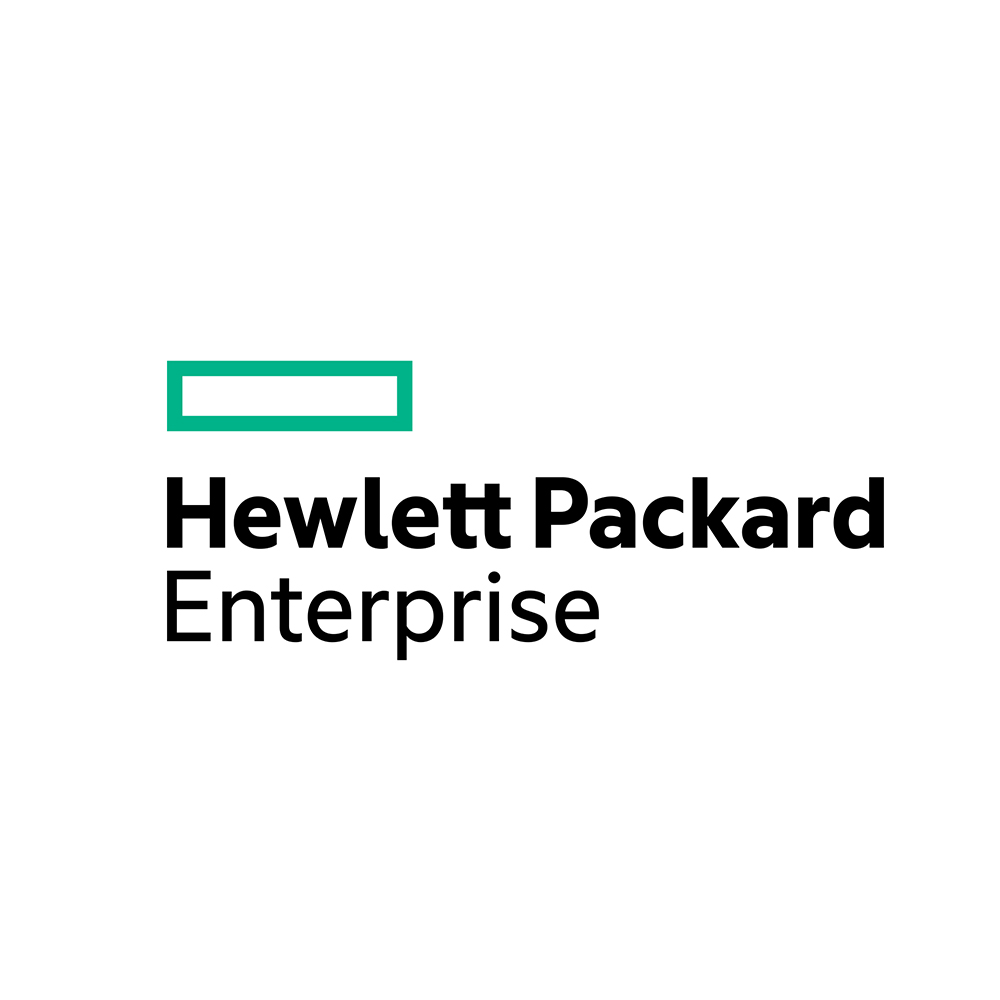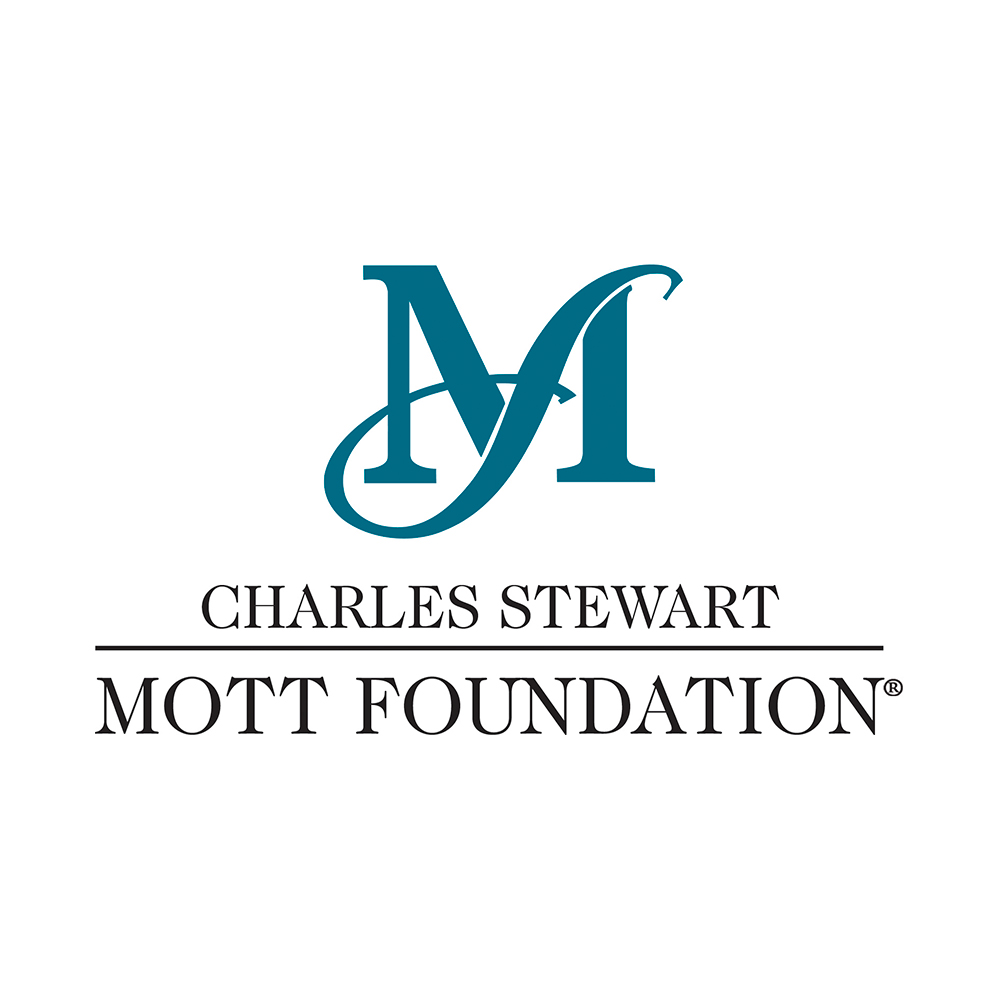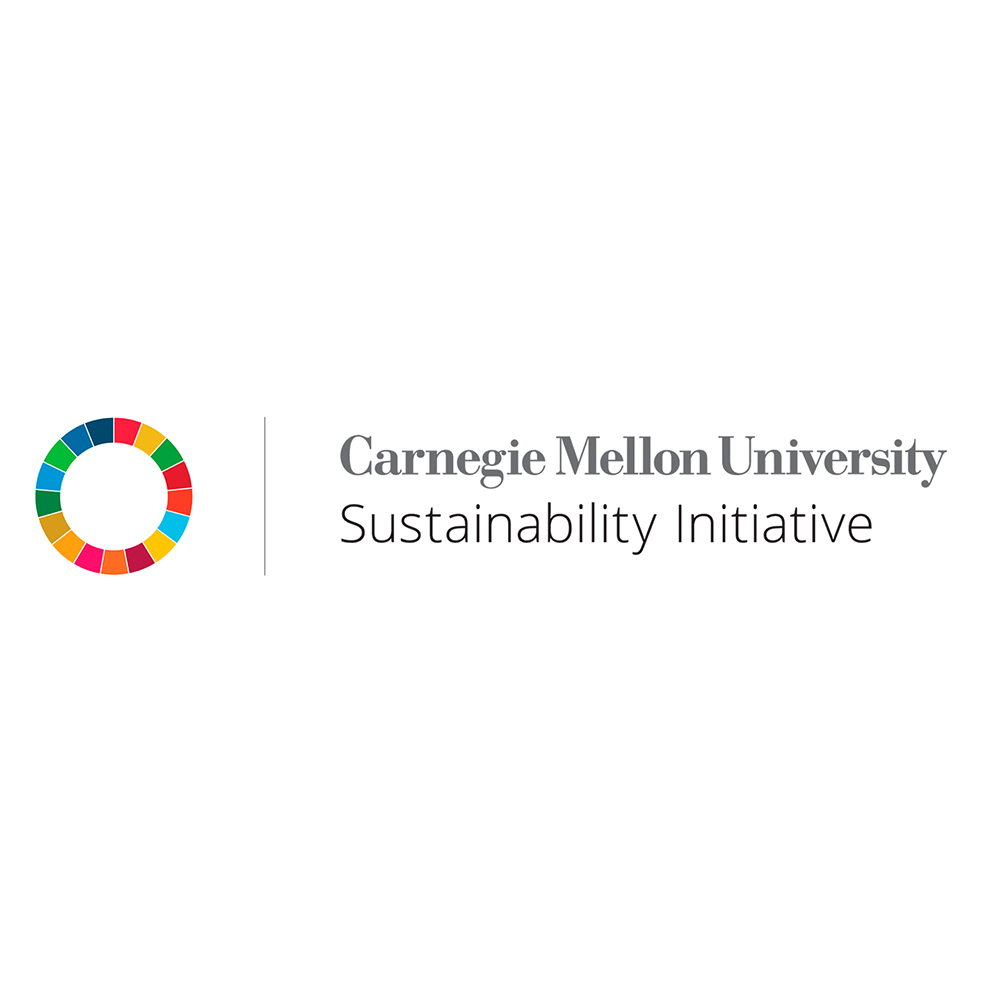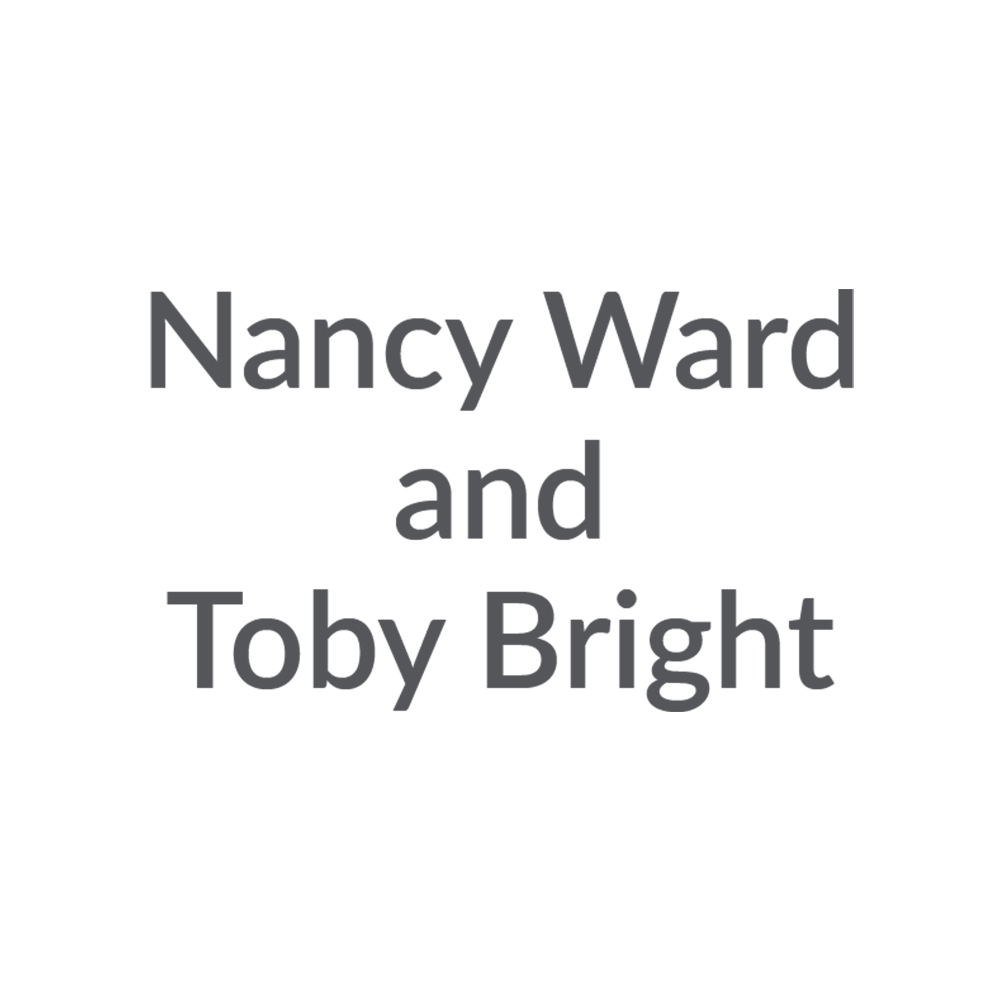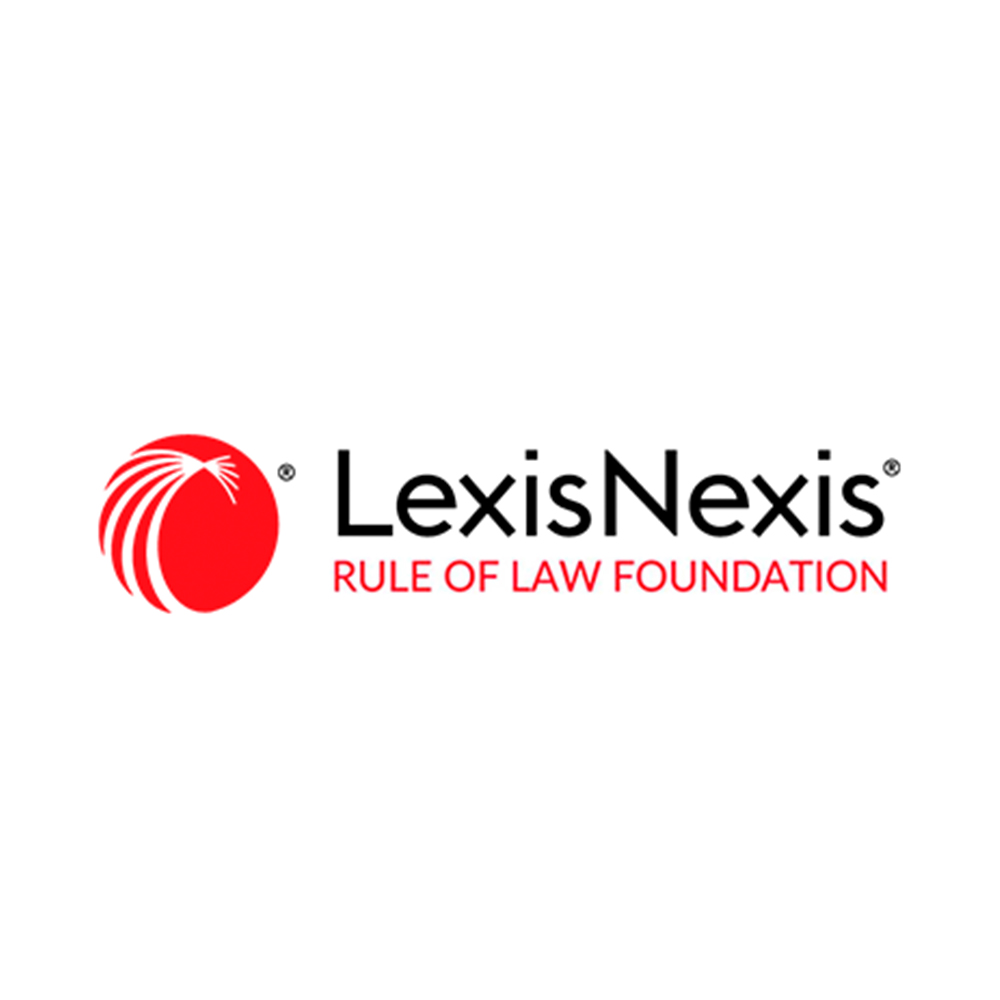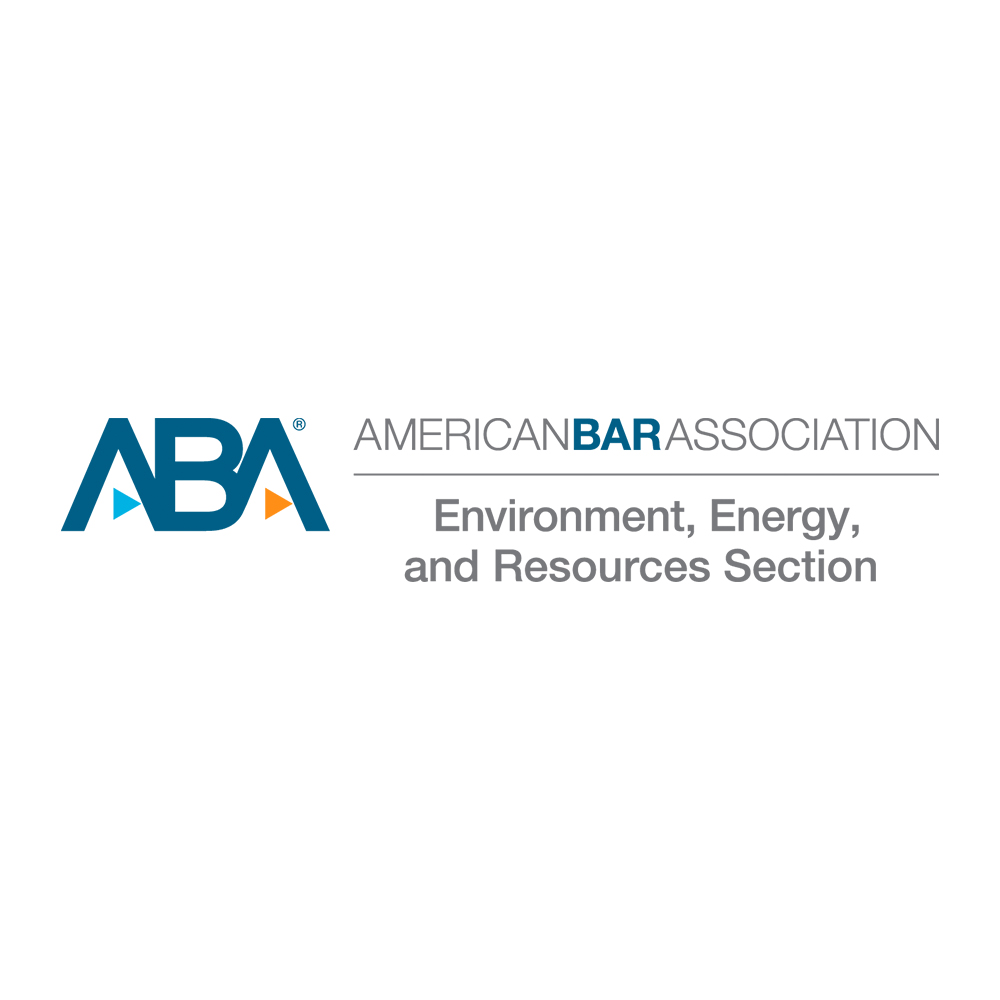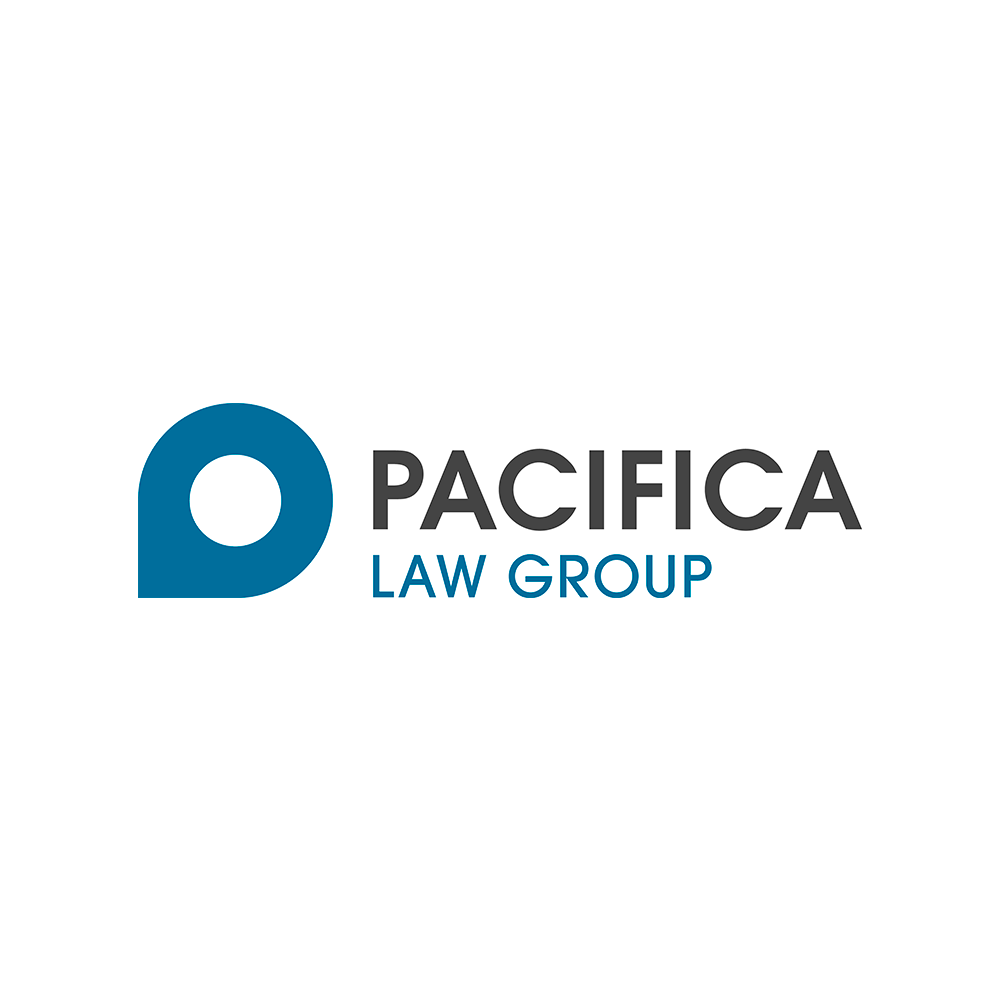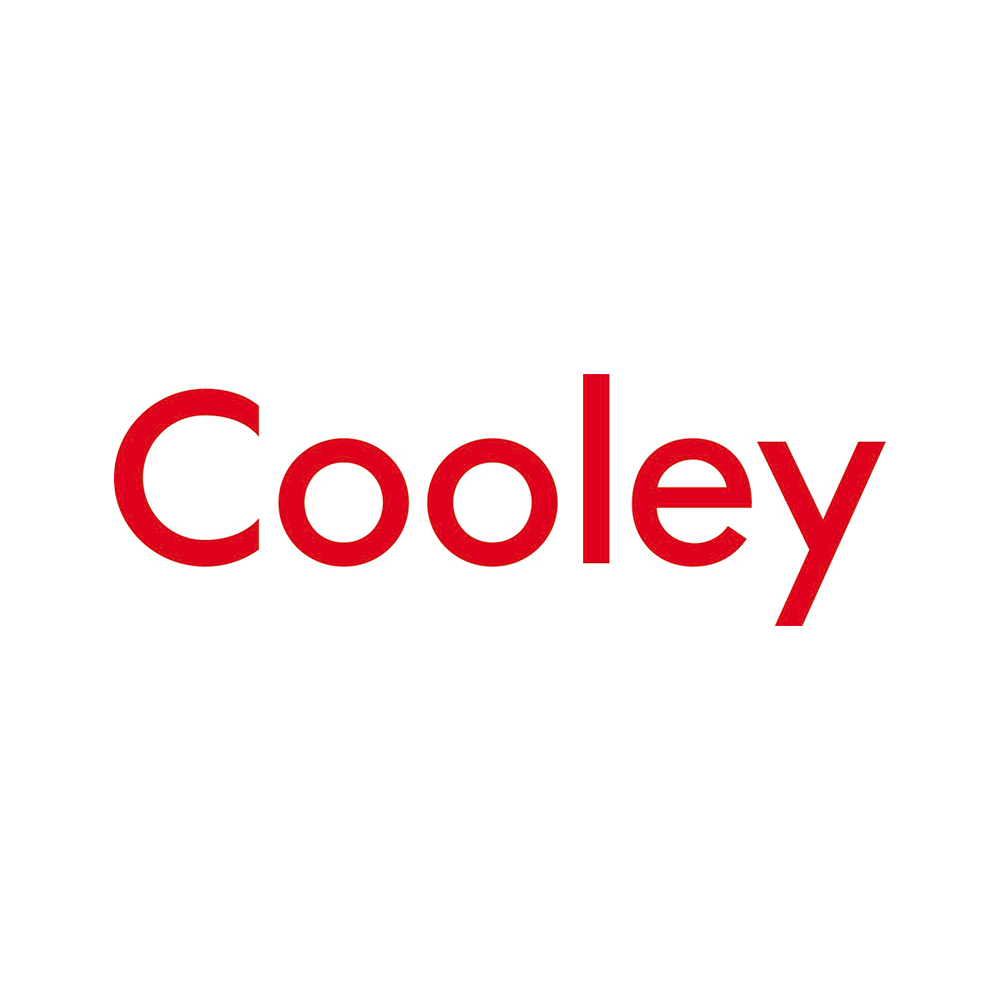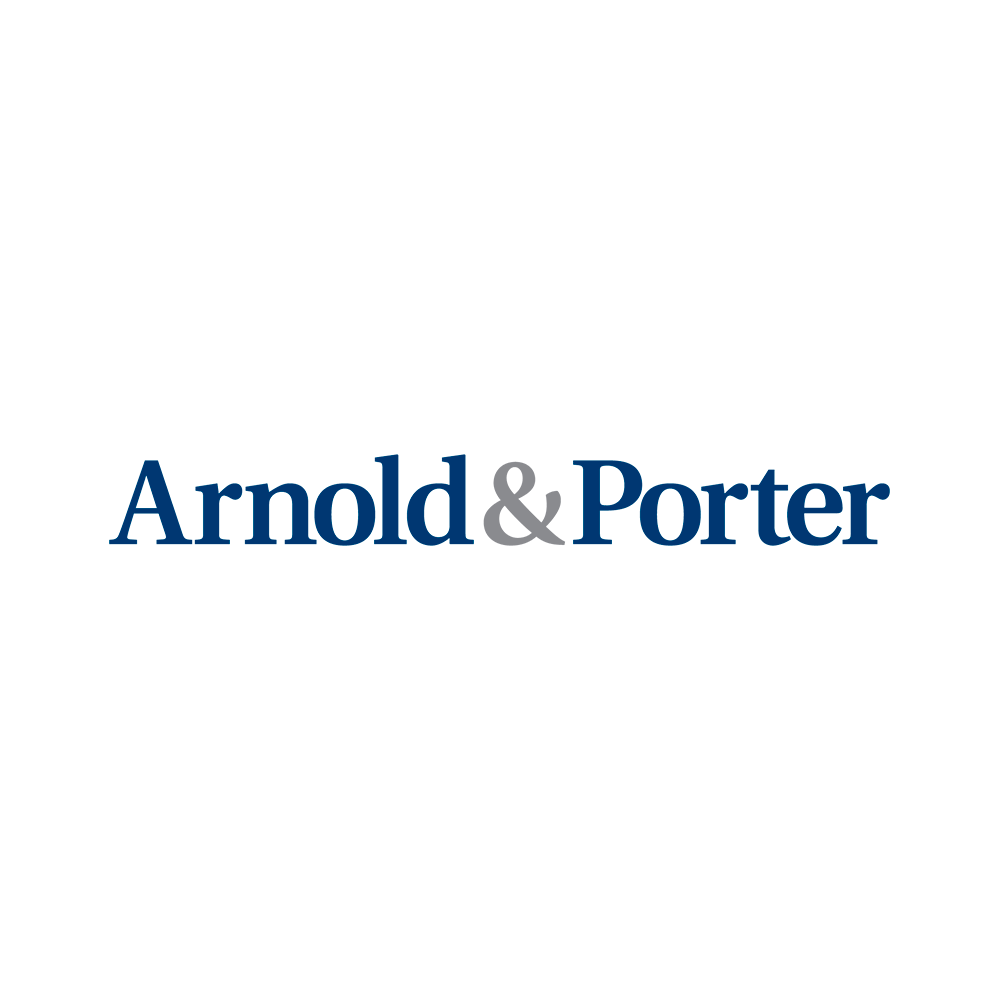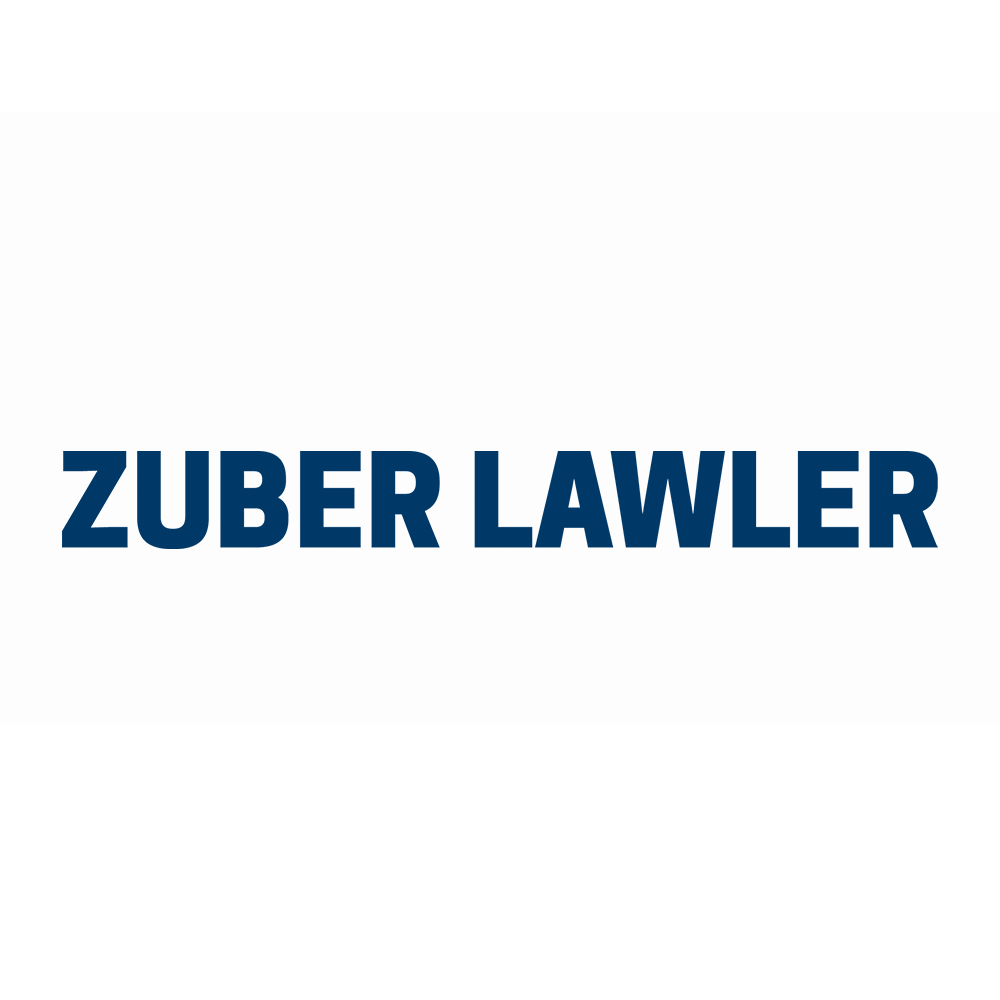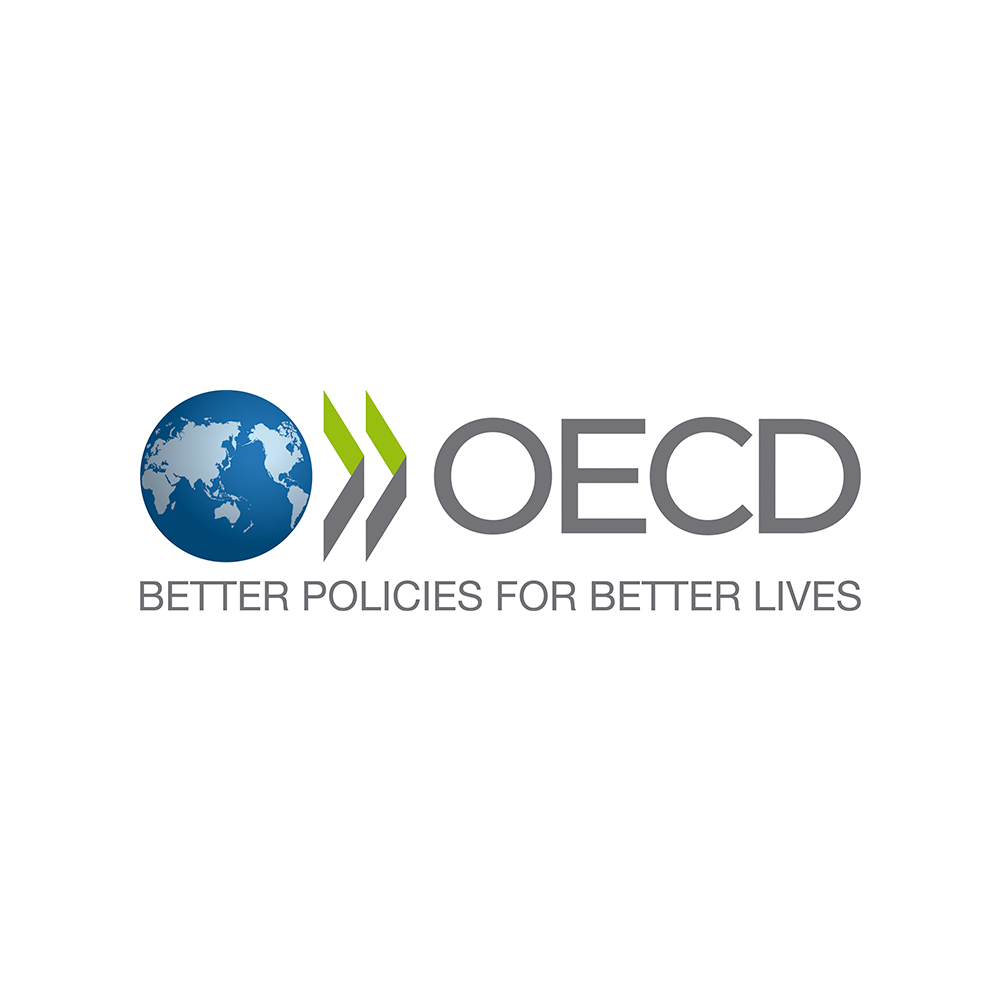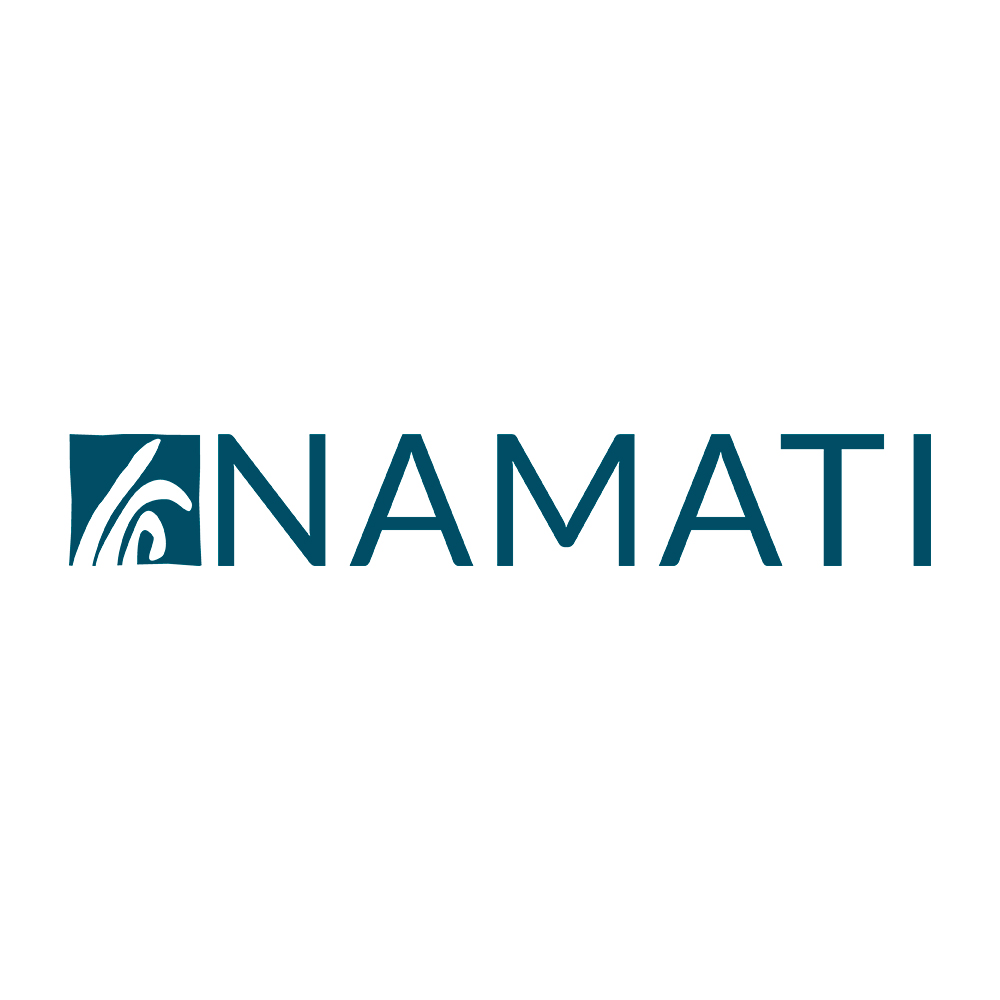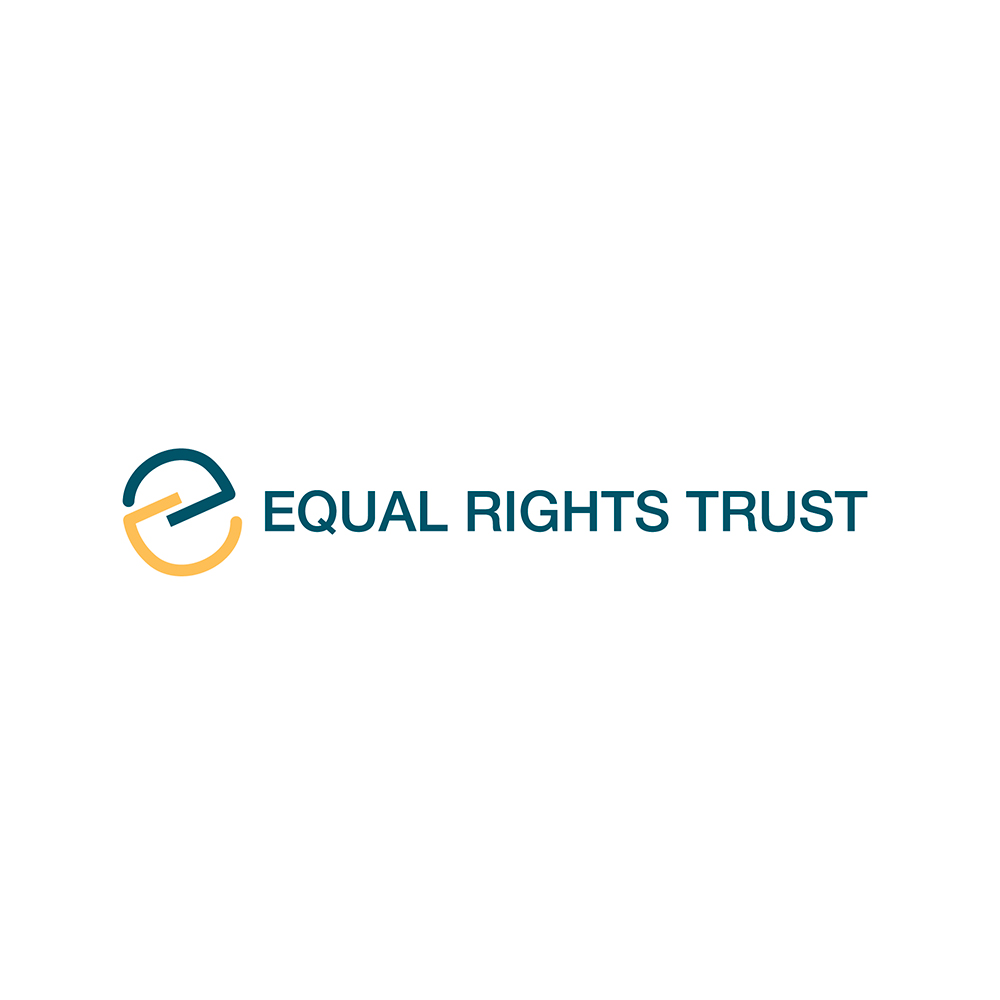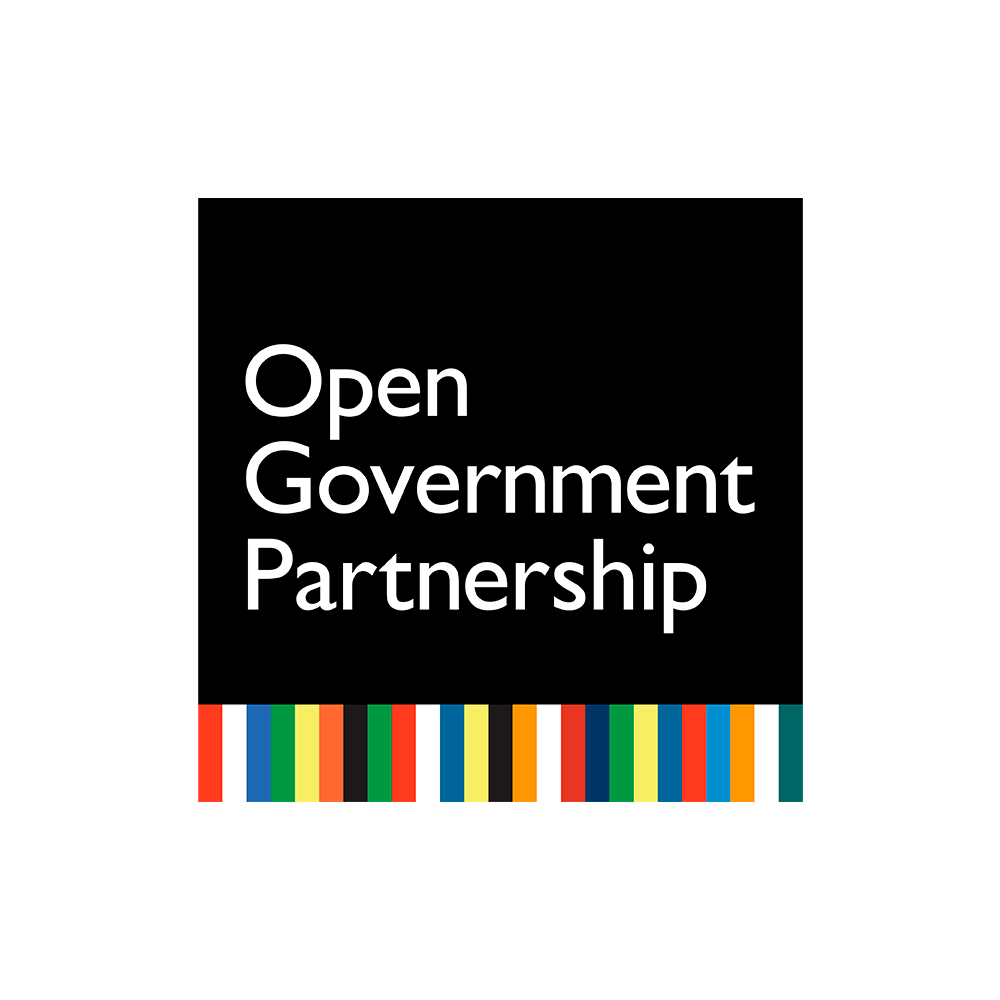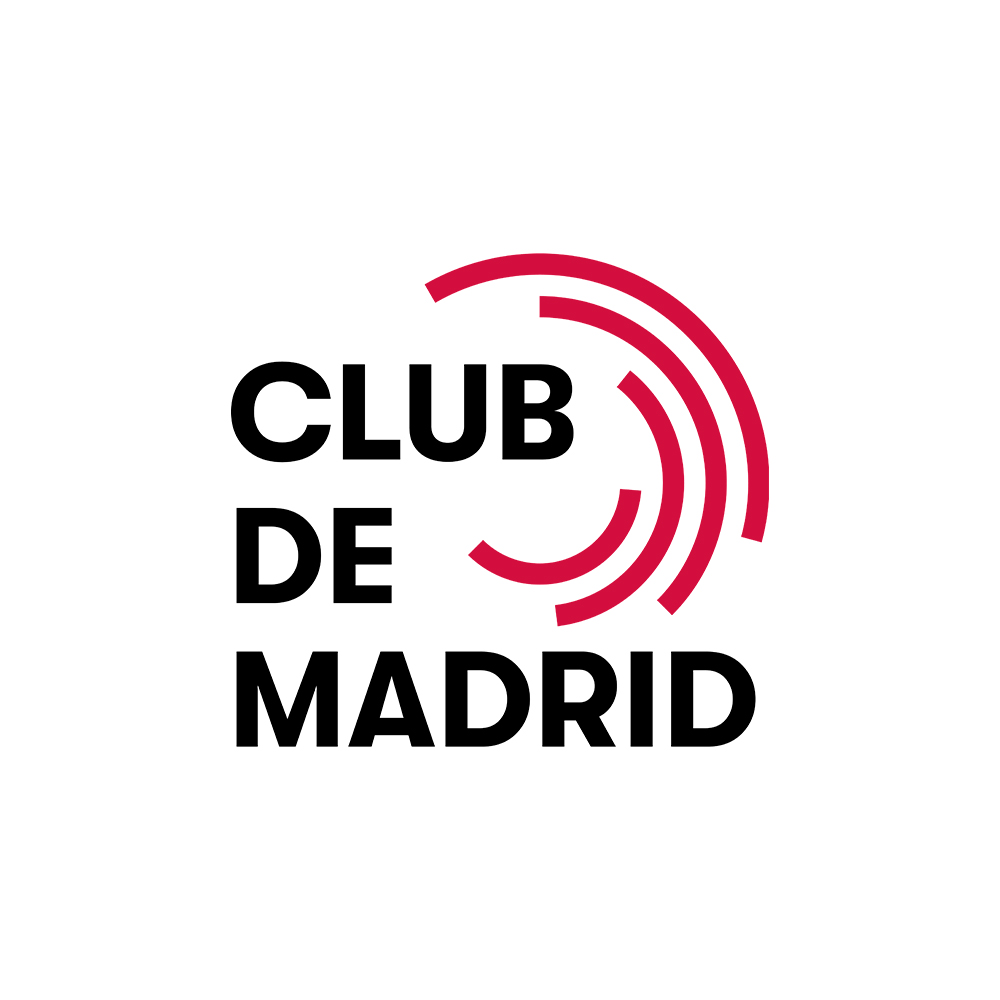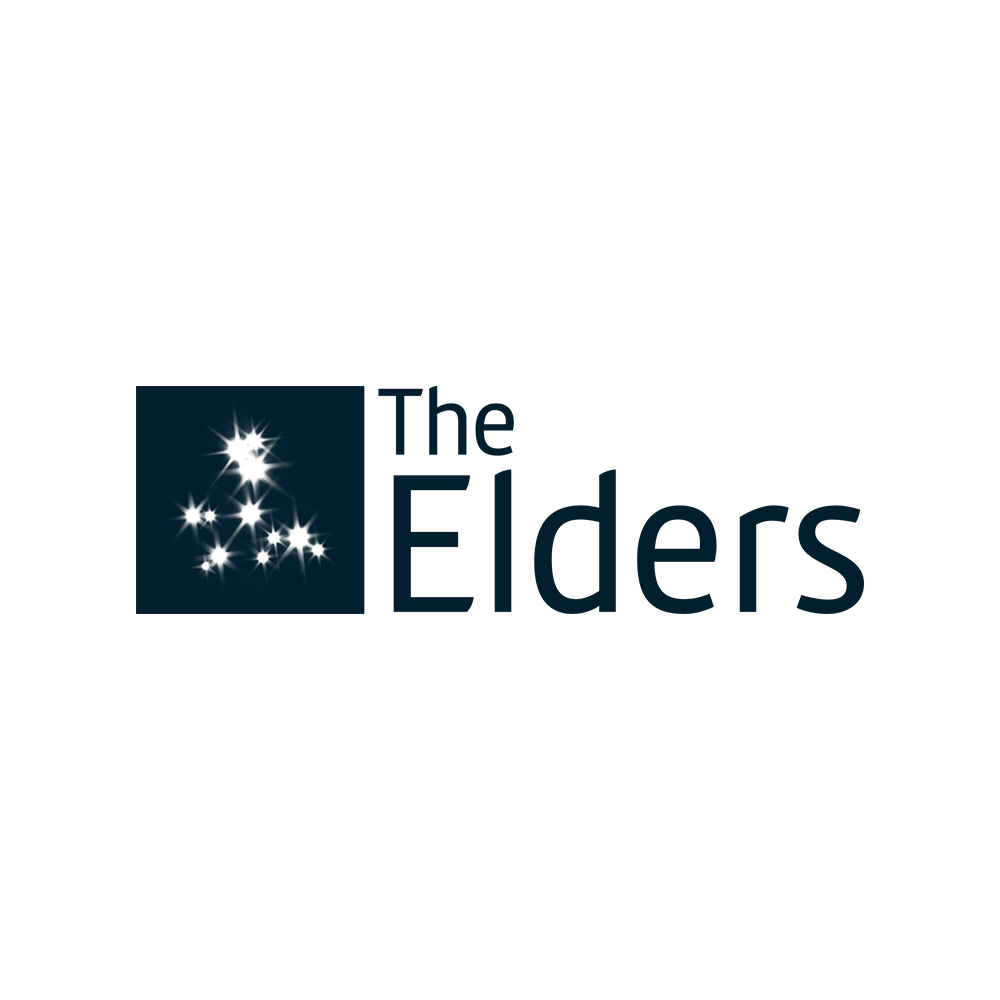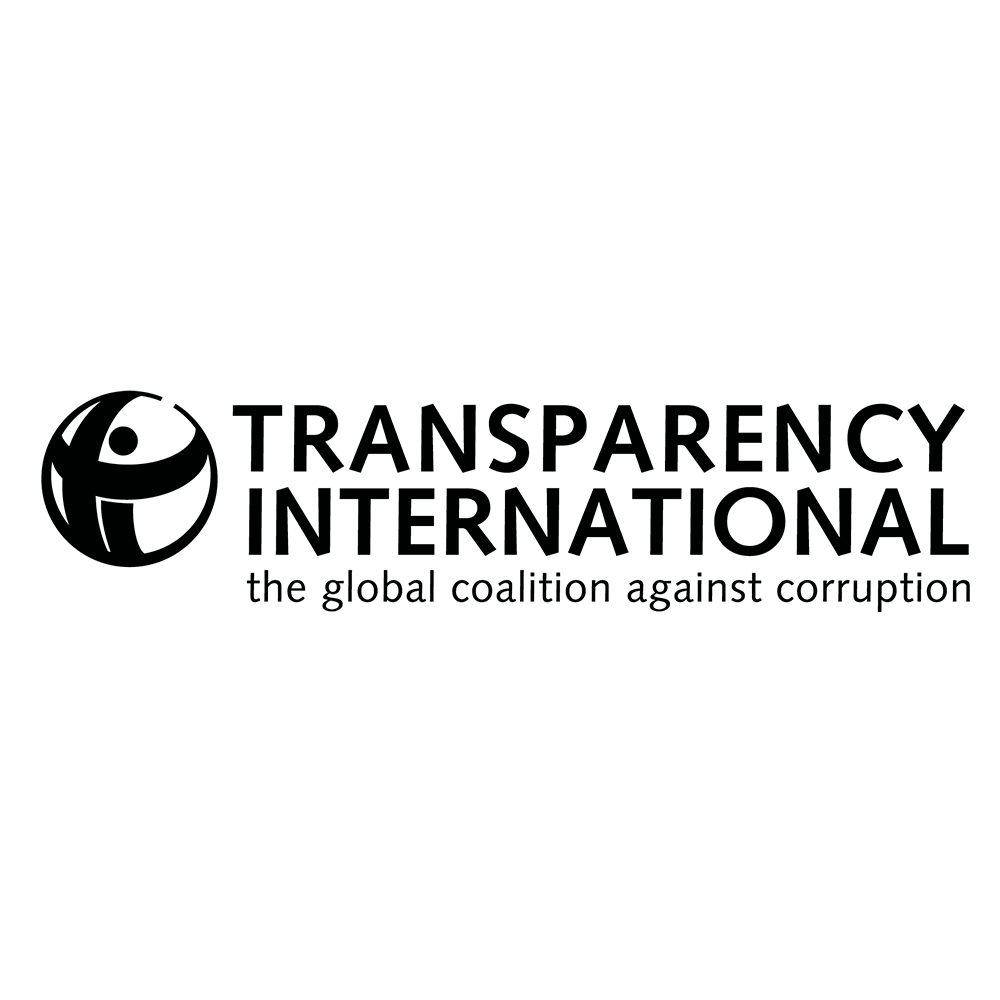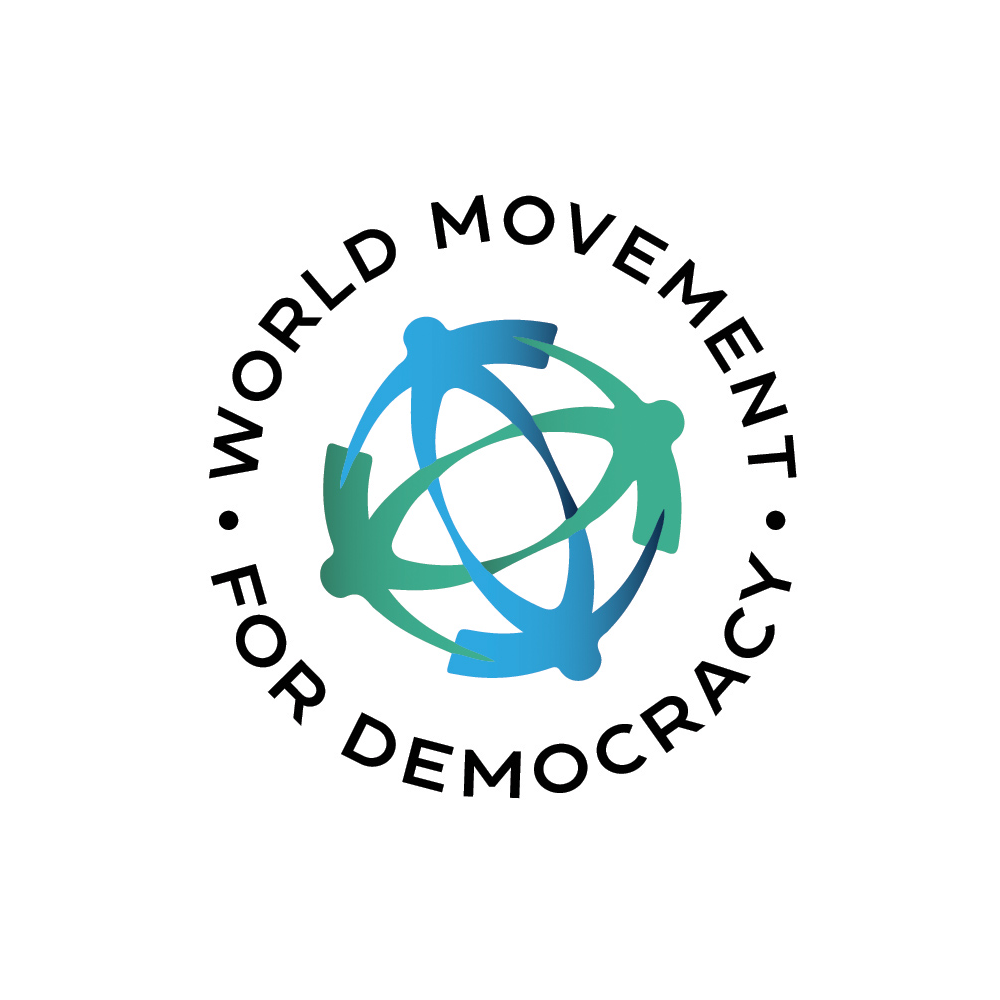Introduction
About the World Justice Project
Forum Highlights by the Numbers
Key Links
Defining challenges
- The Global State of the Rule of Law - Opening Plenary
- Realizing Tech for Good: Political, Legal and Ethical Challenges - Plenary
- Defining Challenges and Setting Priorities – Plenary
- Working Sessions
- Spotlight: Rule of Law Award
Identifying What Works
- Identifying What Works – Plenary
- People-Centered Justice: How to Make it Happen Systematically? – Plenary
- Spotlight: The World Justice Challenge 2022
- Offsite Working Sessions
- Spotlight: Celebrating Justice Through the Arts
Recommendations, Commitments and Action
- Ruth Bader Ginsburg Legacy Keynote Conversation with Sherrilyn Ifill
- Recommendations, Commitments, and Investments to Advance Justice and Rule of Law – Plenary
- Working Sessions
- Closing Plenary
- Spotlight: Final Statement on Building More Just Communities
- Outcomes and Next Steps
Sponsors & Partners
Outcome Report
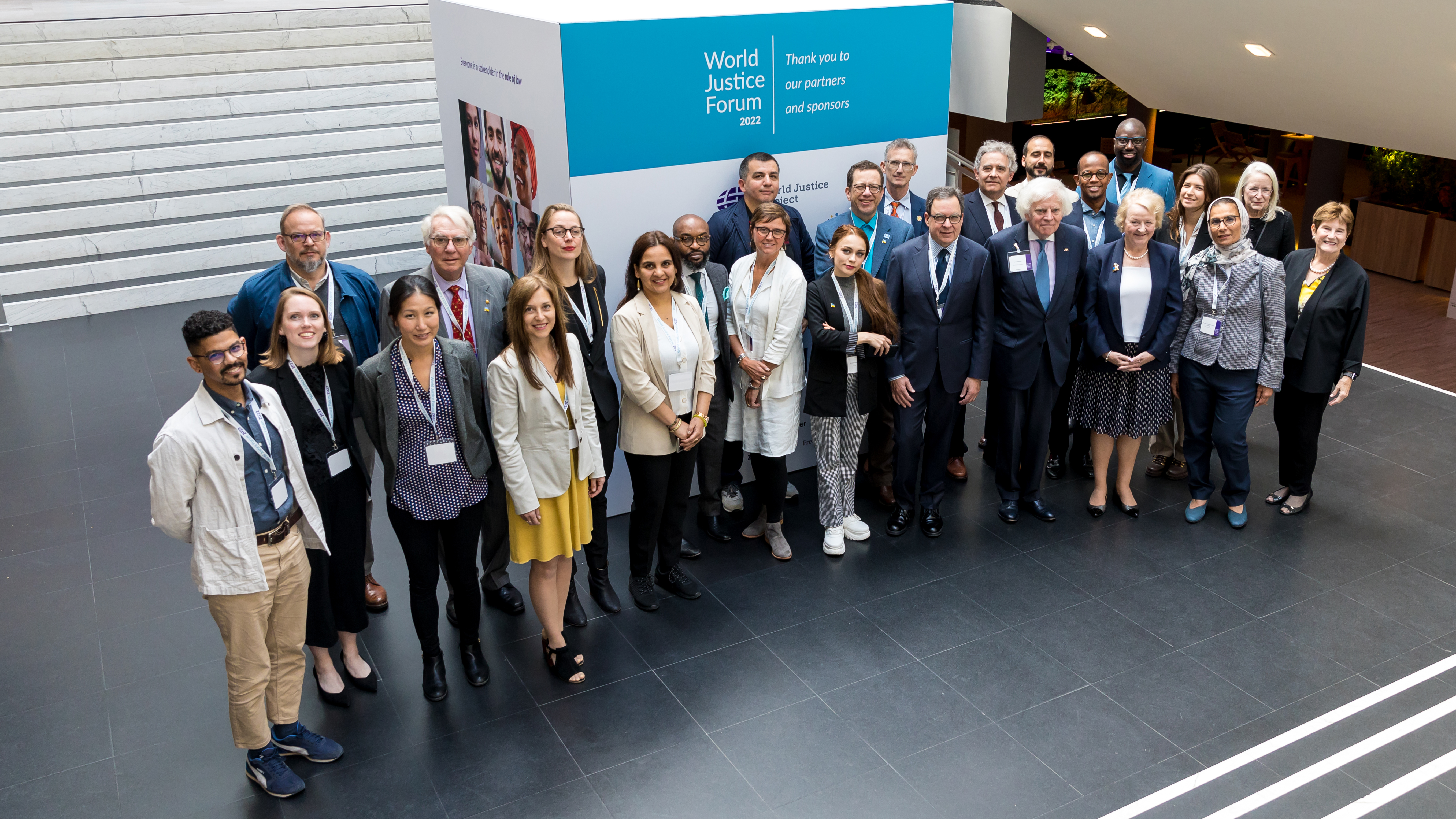 Partners & Sponsors at the World Justice Forum 2022
Partners & Sponsors at the World Justice Forum 2022
Introduction
As documented in the Rule of Law Index 2021, the pandemic has underscored the dire need to tackle the root causes of the global rule of law crisis. Over the past several years we have witnessed communities falling further behind the ambitious goal to “leave no one behind” as promised by the Sustainable Development Goals (SDGs). Women and girls face persistent barriers to fair treatment, minority communities vulnerable to environmental harm scramble to find safer ground to live in peace and dignity, and activists struggle to maintain civic space to hold decision makers accountable. These problems share a common feature: unaccountable governments, corruption, and failure to respect fundamental rights - in other words, weak rule of law.
Advancing a comprehensive rule of law agenda is essential to building fair and healthy communities. From May 30 - June 3, 2022, the World Justice Project (WJP) convened over a thousand change-makers in The Hague, Netherlands and online to tackle these challenges together at the World Justice Forum: Building More Just Communities. The Forum was an inspiring week of learning, agenda-setting, and action for diverse stakeholders from civil society, government, media, the private sector, academia, international organizations, and beyond. For those participants who attended in person, coming together to meet fellow rule of law champions after several years of remote gatherings was profoundly meaningful and energizing.
This year, WJP and its partners convened the Forum around three intersecting themes of critical importance to today’s rule of law movement: Anti-Corruption and Open Government; Access to Justice; and Equal Rights and Non-Discrimination. Throughout the week Forum participants explored these issues to identify key challenges, find solutions, and make recommendations for action and investment. Some notable areas of consensus included an emphasis on data-driven approaches, the value of cross-sector collaboration, the critical role of political will and citizen demand, and the importance of linking ongoing rule of law work to achieving the SDGs by 2030. As a global platform to advance rule of law priorities, the Forum was a strategic venue for participants to launch initiatives, announce partnerships, release new research, and take other actions toward building more just communities. Some of these included the adoption of the Justice Action Coalition’s Justice Appeal 2023, the drafting of the “Declaration of Whistleblower Rights,” the launch of UNDP’s Justice Futures CoLab, and the announcement of the Innovating Justice Fund.
The Forum Final Statement on Building More Just Communities captures these outcomes and other key insights from the week’s discussions, highlighting priority concerns and recommendations corresponding to each Forum theme. The statement calls on all leaders to actively defend and advance universal principles of accountable government and human rights, and it articulates clear goals as we prepare for the Sustainable Development Goals Summit to be convened by the United Nations in September 2023.
WJP is honored to have hosted this global gathering as a meeting place for innovative and dedicated rule of law change-makers. We hope the Forum bolstered our community in continuing their critical work to advance the rule of law at home and around the world. We welcome your continued engagement and look forward to meeting again at future national and regional in-person and on-line events and at the next World Justice Forum.
Signed,
William C. Hubbard, Co-Founder and Board Chair
William H. Neukom, Co-Founder and CEO
Elizabeth Andersen, Executive Director
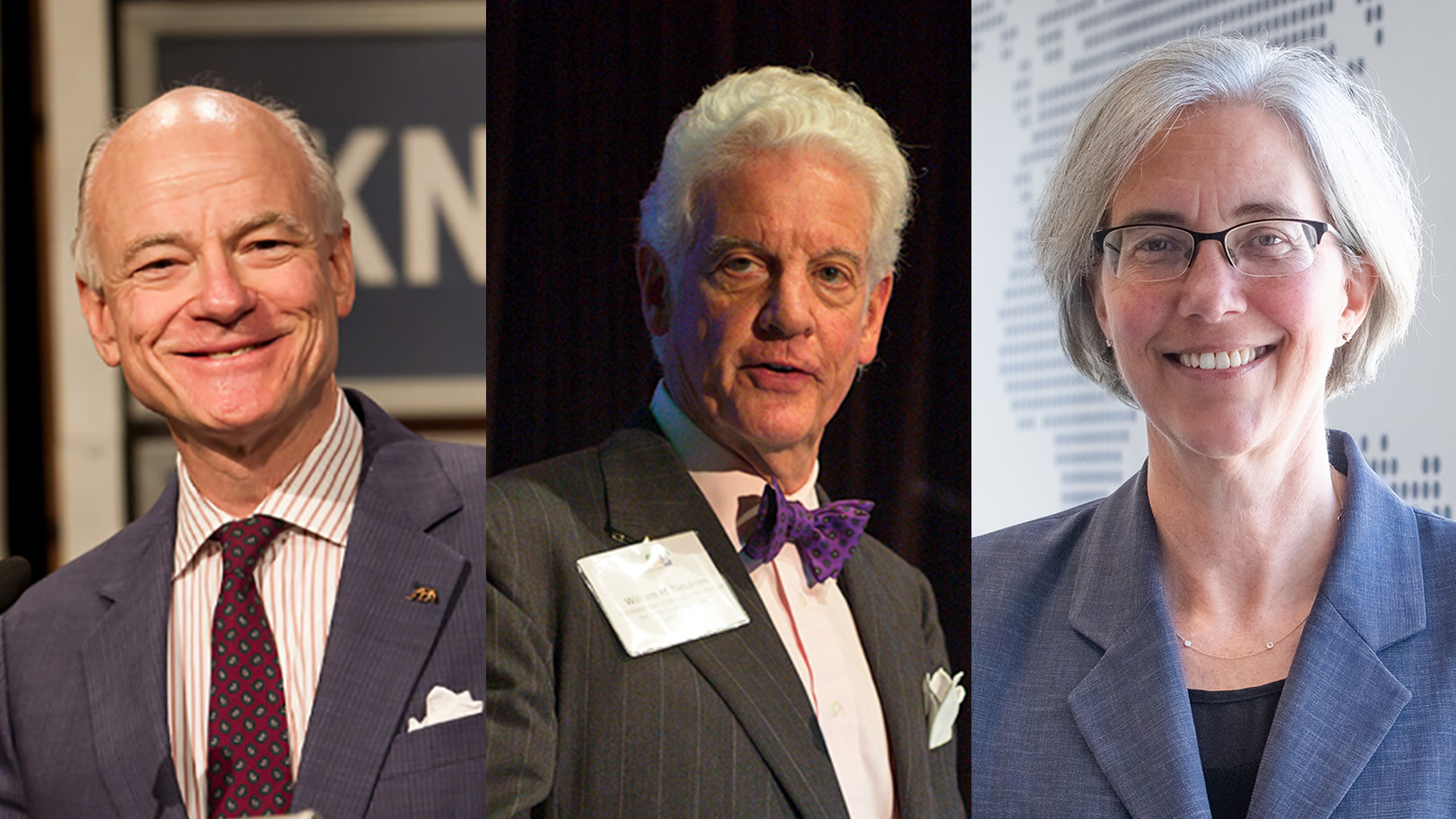 William Hubbard (left), Bill Neukom (center), Elizabeth Andersen (right)
William Hubbard (left), Bill Neukom (center), Elizabeth Andersen (right)
About The World Justice Project
The World Justice Project (WJP) is an independent, multidisciplinary organization working to create knowledge, build awareness, and stimulate action to advance the rule of law worldwide. Effective rule of law reduces corruption, combats poverty and disease, and protects people from injustices large and small. It is the foundation for communities of justice, opportunity, and peace—underpinning development, accountable government, and respect for fundamental rights. Traditionally, the rule of law has been viewed as the domain of lawyers and judges. But everyday issues of safety, rights, justice, and governance affect us all; everyone is a stakeholder in the rule of law. Based on this, WJP pursues a multidisciplinary approach to advancing the rule of law.
WJP does this through its Rule of Law Index, a rigorous collection of comparative data measuring the performance of the rule of law in 140 countries around the world, as well as through activities such as the World Justice Forum, World Justice Challenge, and country-level research and outreach in Mexico and elsewhere.
Forum Highlights by the Numbers
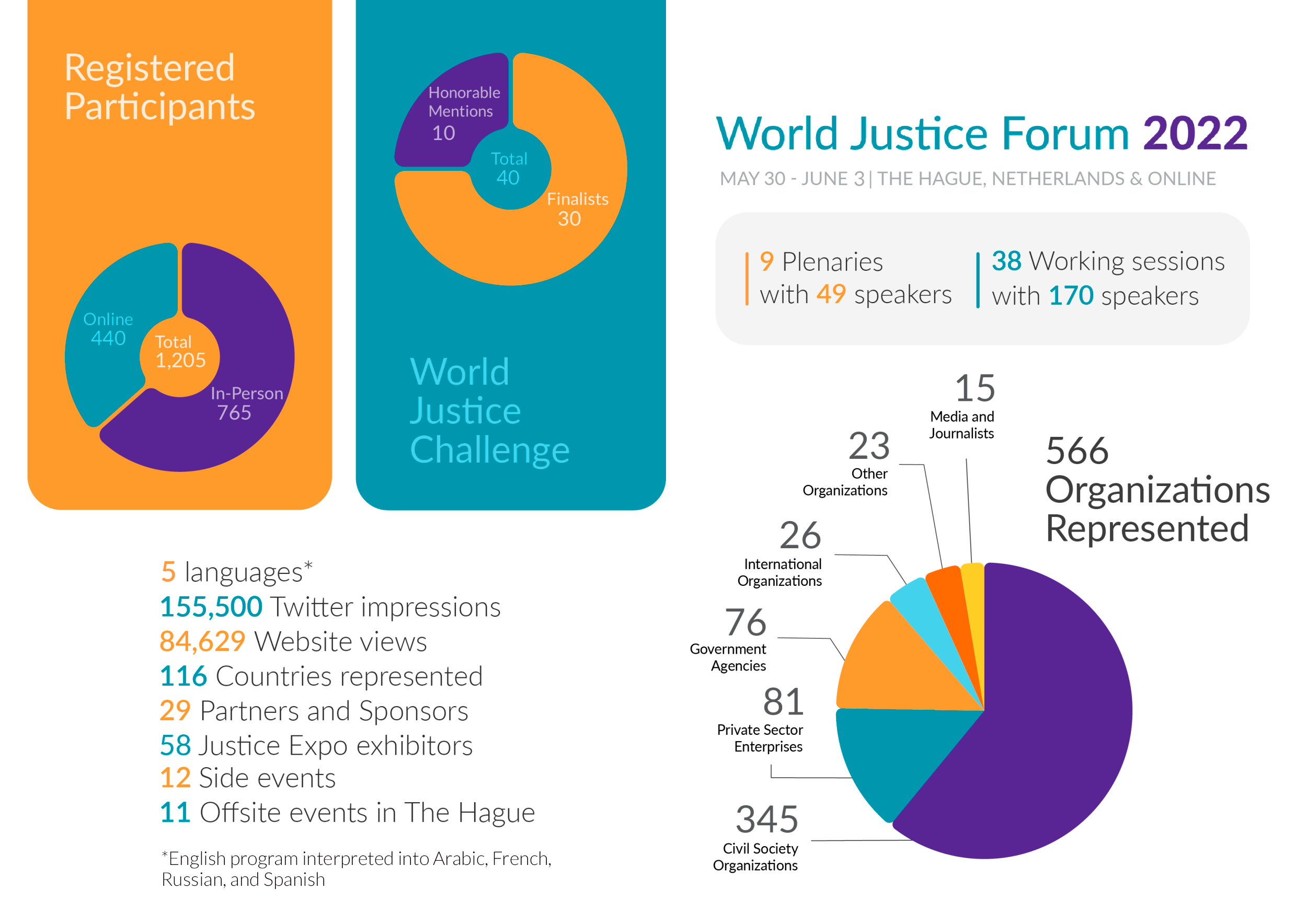
Key Links
World Justice Forum Final Statement
Forum Plenary Session Video Recordings
Forum Working Session Video Recordings
World Justice Challenge Finalist Showcase Video Recordings
World Justice Challenge Forum Outcome Report [PDF]
Defining Challenges
Watch the video below for a brief recap of the first day of the Forum.
The Global State of the Rule of Law - Opening Plenary
The first day of the Forum was dedicated to assessing the global state of the rule of law, reviewing what the data tells us about key rule of law challenges, and determining the most urgent and promising priorities to tackle based on that evidence. As documented in WJP’s 2021 Rule of Law Index, more countries declined than improved in their overall rule of law performance for the fourth consecutive year. This downward trend was seen in every region of the world and in rich and poor countries alike, encompassing a range of factors related to access to justice, government transparency, anti-discrimination protections, and civic participation.
With this sobering data setting the stage, the Forum’s Opening Plenary featured global rule of law leaders who shared their insights on current justice and governance trends. WJP Co-Founder and Board Chair William Hubbard opened the conference by noting “the global pandemic has laid bare grave injustices and made clear the price we pay for neglecting the rule of law.” The first speaker, UN High Commissioner for Human Rights Michelle Bachelet, stressed that the Forum’s main themes - corruption, discrimination, and access to justice - are key to achieving the SDGs. She emphasized that acting on these goals, as laid out in the UN Secretary-General’s “Our Common Agenda Report,” must be our central and shared objective. She also spoke to the discriminatory impacts of COVID-19 on marginalized communities and shared her view that comprehensive anti-discrimination laws hold transformative power to address human rights abuses globally.
Following these remarks, International IDEA’s Kevin Casas-Zamora moderated a conversation among global leaders. Casas-Zamora reminded the Forum audience of the timely nature of the Forum’s discussions, as the pandemic and the war in Ukraine have recently put a spotlight on core issues of fairness, rights, and justice. This sentiment was echoed by Vera Jourová, Vice President of the European Commission for Values and Transparency, who observed that the Forum’s timing against the backdrop of Russia’s illegal aggression in Ukraine highlighted that the “time of innocence” in Europe and elsewhere - the belief that the rule of law is automatic and guaranteed - is definitively over, and that defending the rule of law is no longer an abstract matter.
Panelists discussed the prevailing challenges they face in their regions, with the consistent observation that these regional issues have global connections. On the topic of rising authoritarianism, Mo Ibrahim of the Mo Ibrahim Foundation noted that while autocrats are gaining power in Africa, this is not an African invention but a reflection of increasing strongman trends around the world. Jourová likewise said that if given the power to “save the world,” her first action would be to convince those in power to accept and respect the limits of that power.
Speakers also identified grand corruption as a significant threat to the global state of rule of law and democracy. Mohamed-Lamin Tarawalley, Attorney-General and Minister of Justice of Sierra Leone, explained that Africa is subject to persistent labor and taxation loopholes resulting from investment and development from Northern countries, underscoring how corruption on the continent is enabled by global actors and policy gaps. Ibrahim emphasized that autocrats on the continent and elsewhere can easily hide their wealth in shell companies overseas. The panelists cited worldwide implementation and enforcement of rules to disclose beneficial ownership of private companies and better financial governance by wealthy countries as critical steps to curbing corruption.
A final message of the discussion was that rule of law cannot be detached from development and the well-being of all people, reinforcing the need to address justice and rule of law in the context of the SDGs. The panelists agreed that the challenges are enormous, but so is the commitment of rule of law actors to taking those challenges on.
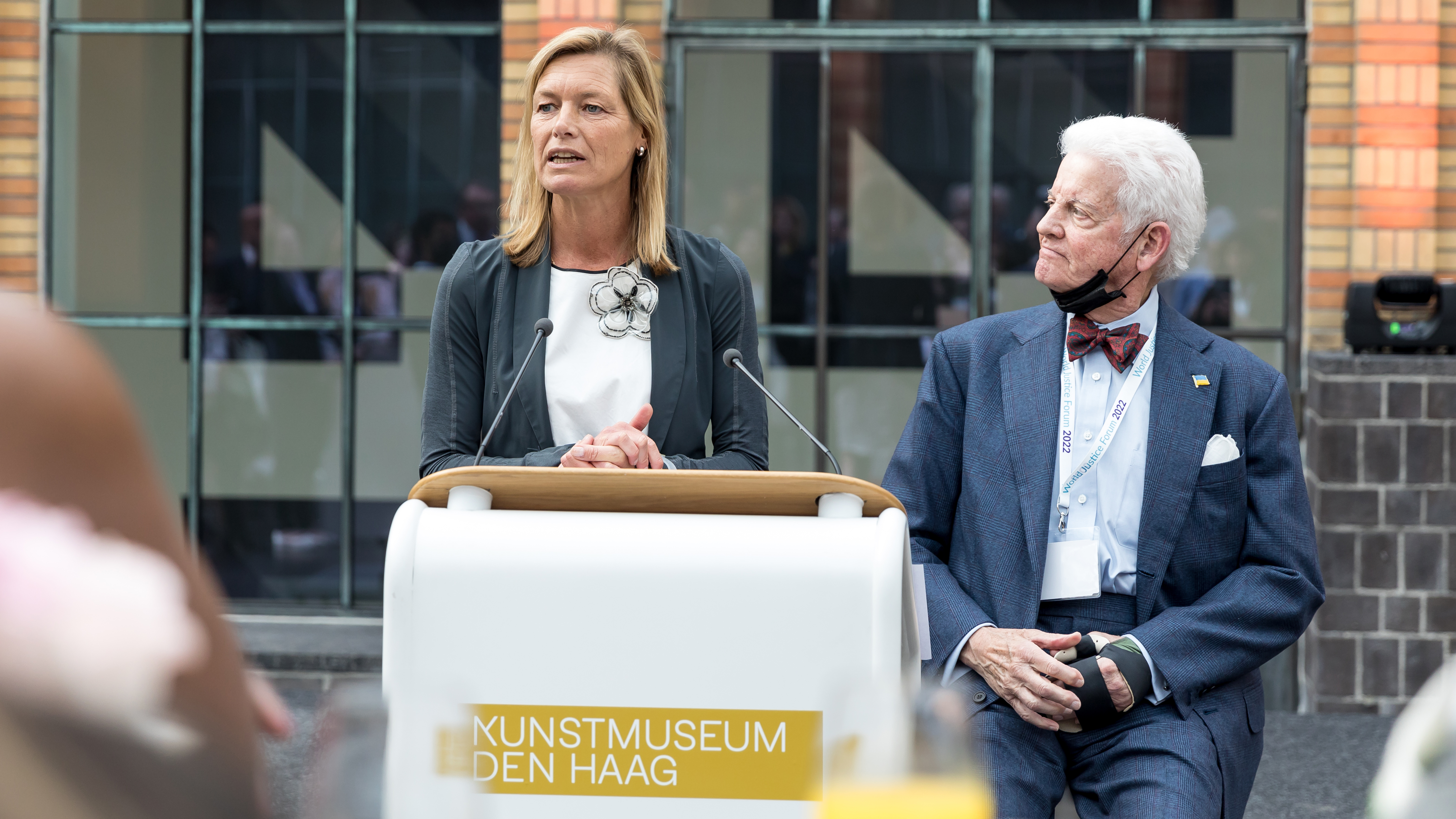 Marriët Schuurman, Director of Stability and Humanitarian Aid at the Dutch Ministry of Foreign Affairs, speaking at the welcome reception with World Justice Project Co-Founder and CEO Bill Neukom.
Marriët Schuurman, Director of Stability and Humanitarian Aid at the Dutch Ministry of Foreign Affairs, speaking at the welcome reception with World Justice Project Co-Founder and CEO Bill Neukom.
“This week [at the Forum] provides an excellent opportunity to learn from each other, to have good conversations, to be inspired, and to create opportunities” - Marriët Schuurman, Director of Stability and Humanitarian Aid at the Dutch Ministry of Foreign Affairs
Realizing Tech for Good: Political, Legal and Ethical Challenges - Plenary
Day One included a special thematic plenary session on the promise and risks of technology, with a focus on legal and ethical regulation of automation and artificial intelligence (AI). As moderator, the Council of Europe’s Jan Kleijssen raised the example of the recent Dutch child care benefits scandal, in which authorities used a self-learning algorithm to detect fraud in the benefits system. This automated tool incorrectly labeled many individuals as abusing their benefits and disproportionately targeted minorities, resulting in widespread denial of benefits that led to increased poverty, unnecessary family separation, and in some instances, death.
With this cautionary tale in mind, the conversation turned to the effect AI can have on citizens’ lives. Panelists discussed various approaches for balancing AI’s ability to increase efficiency and lower costs against the countervailing risks of error and non-transparency. Adrián Vázquez Lázara, Chair of the European Parliament’s Legal Affairs Committee, discussed how the committee is evaluating the ethical use of technology and the complexity of building an appropriately flexible regulatory framework for the rapidly developing applications of AI. He argued for a risk-based approach that prioritizes human oversight for applications that pose greater risks.
Focusing on the use of AI tools in judicial proceedings Simone Cuomo, Secretary-General of the Council of Bars and Law Societies of Europe, warned of the potential for AI to undermine core principles governing such proceedings, including equality between the parties and transparency of judicial decision-making. He urged that rather than adapting trials to AI, “AI tools need to be adapted to the justice environment,”
Pam Wood of Hewlett Packard Enterprise emphasized the value of the UN Guiding Principles on Business and Human Rights as a normative framework for the private sector to address these questions, and recommended embedding both technical and human safeguards into the development and execution of automated technology. Ming Tan, Executive Director of the Tech for Good Institute in Singapore, brought a regional perspective focused on the unique and uneven digital access environment in Southeast Asia, where 30% of people do not have reliable internet access, and yet mobile technology is bringing rapid change, with 90% of the 400 million internet users in the region being “mobile natives,” meaning they accessed the internet for the first time via their mobile phones. She emphasized the very real risks of not realizing an inclusive digital economy and stressed the importance of localized solutions. Critically, she reminded the panel that adoption of tech must be underpinned by trust, and that we must concern ourselves with the consequences of new technologies that disrupt or leapfrog traditional trust institutions like governments, banks, or courts. Ultimately, as Kleijssen summarized in his closing remarks, “we have to shape AI to adapt to our societies, to our values, and to ourselves, and not the other way around.” ”
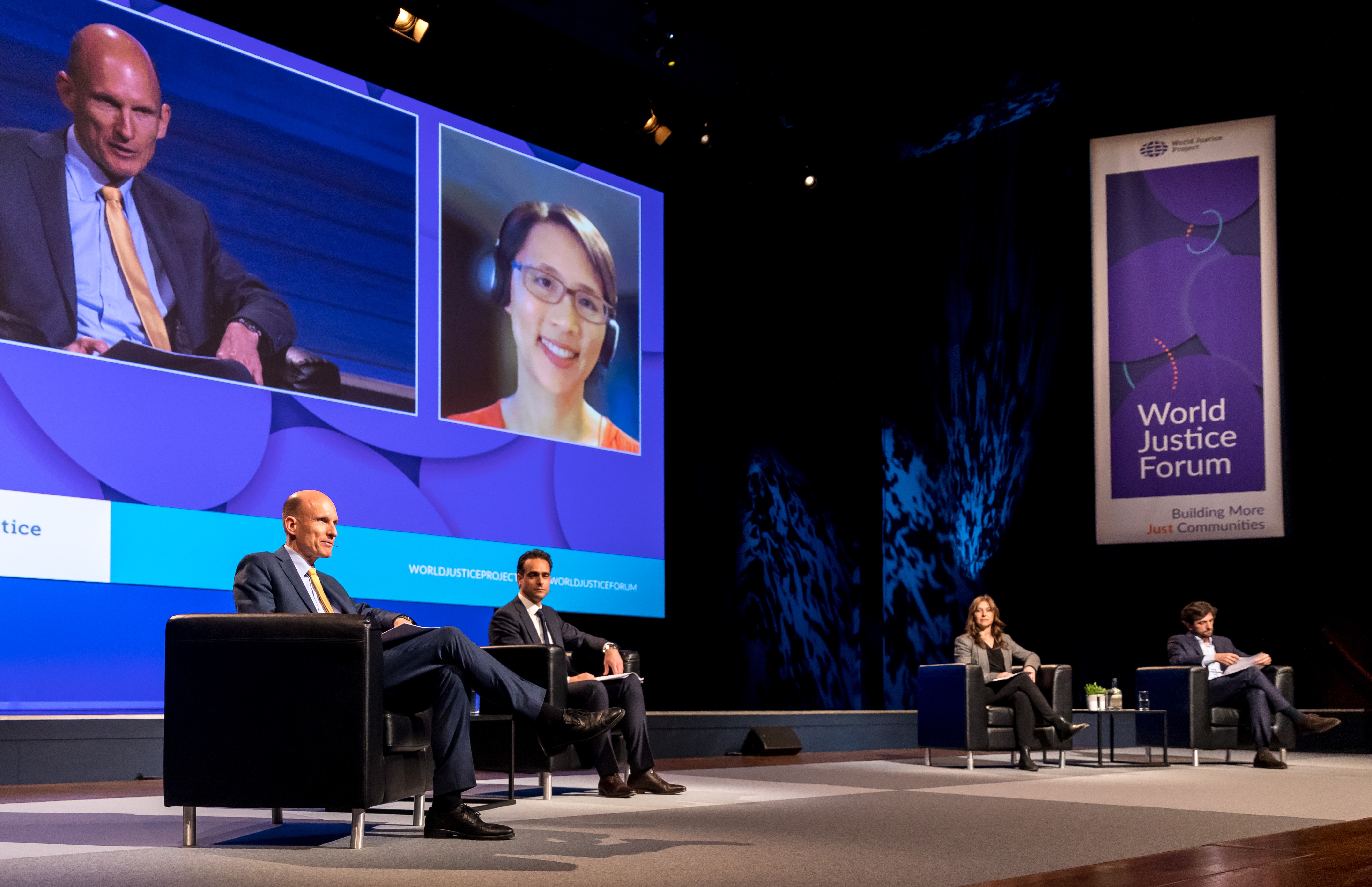 Panelists at the Realizing Tech for Good: Political, Legal, and Ethical Challenges plenary
Panelists at the Realizing Tech for Good: Political, Legal, and Ethical Challenges plenary
Defining Challenges and Setting Priorities - Plenary
Charting the path forward to advance the rule of law requires utilizing data and evidence to understand the most promising and strategic approaches. The next plenary of the day, “Defining Challenges and Setting Priorities,” probed key questions about the use of data, data gaps, and what the existing evidence tells us about priority areas for action.
A consistent theme that emerged was the importance of local, granular data to understand how people experience justice in their everyday lives. As Arizona State University Professor Rebecca Sandefur pointed out, most justice problems never reach the formal justice system. As a result, there is a dearth of information about how justice problems are actually solved, and about whether they are solved justly. India Justice Report’s Maja Daruwala told the group, “If you really want to get down to where people are experiencing injustice, then you are looking to granularity - what does the delivery of justice look like in a village? In a small town?” Microsoft’s Steve Crown added, “If you want to be truly global, you need to be radically local” by collecting detailed information that allows decision makers to understand the human experience behind their policies.
Panelists also discussed the need for data disaggregation to address systemic discrimination. Equal Rights Trust Director Jim Fitzgerald noted that certain groups - such as LGBTQI+ communities, children with disabilities, and minority ethnic and religious groups - fall outside of data collection in many countries. In cases where data on these populations is available, it tends to be collected at the outcome level, providing information on discrimination that has already occurred. To remedy this he called for an equality by design approach, which entails decision makers gathering data about these groups through direct consultation and using it to design and implement deliberately equitable policies. Moderator Lewis Dijkstra of the European Commission raised emergency COVID measures as a clear example of this issue, where there was a widespread failure to assess and plan for how policy decisions would impact certain groups, such as women, caregivers, and poor communities living in cramped housing. Daruwala echoed the importance of disaggregation, observing how data designated by gender allowed the India Justice Report’s creators to demonstrate gender discrimination to policy makers in a more compelling and objective format.
Finally, the conversation identified several priority areas for collecting better data and implementing stronger evidence-based policy. Fitzgerald emphasized High Commissioner Bachelet’s call for a worldwide uptake of comprehensive non-discrimination legislation, noting that the SDGs already offer a model for this approach by stipulating that every target must be met for all, thereby requiring the ongoing collection of disaggregated data. He also underlined the findings of a recent joint study his organization conducted with Transparency International, which found that corruption and discrimination are mutually reinforcing. Crown spoke about the urgent need to understand the sources of misinformation and disinformation, and Daruwala stressed the value of consistent, standardized data that builds citizen trust and provides a common basis for decision making across silos. Sandefur shared that what she would prioritize is information about how to scale things that effectively empower people to engage with the systems that regulate their lives - which, ultimately, is the goal of access to justice work.
Working Sessions
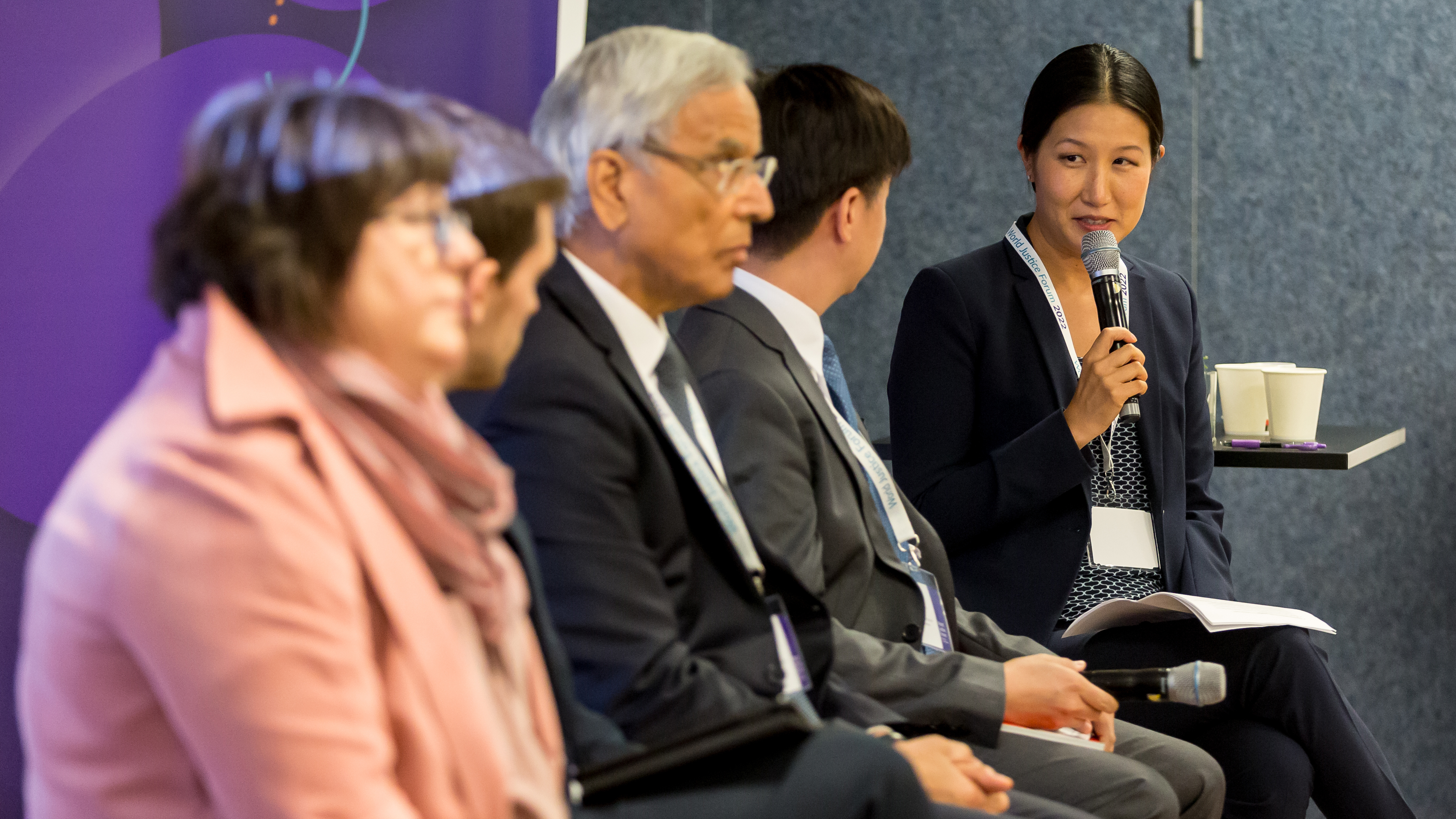 Leslie Tsai addresses the panel during the working session "Corruption Measurement as an Agent of Change" organized by the Chandler Foundation.
Leslie Tsai addresses the panel during the working session "Corruption Measurement as an Agent of Change" organized by the Chandler Foundation.
The Forum’s opening working sessions explored effective techniques and timely debates related to data collection, monitoring, and analysis, as well as the use of evidence to design and implement strategies to build more just communities. Topics explored during these sessions included:
- Community-driven approaches to enhance access to justice: Many working session participants discussed the value of empowering local communities through people-centered justice initiatives. In a panel hosted by the International Development Law Organization (IDLO), Ahmed Ali Adam, Director of the Alternative Dispute Resolution Department at the Somali Federal Ministry of Justice, shared how Somalia has integrated its formal and informal justice systems to ensure that the commonly used informal Xeer justice system better adheres to universal human rights standards. Another session raised Sri Lanka’s community mediation boards as a model for local justice initiatives, and multiple sessions explored community-driven data collection and research as key to operationalizing the Leaving No One Behind principle. Attendees also acknowledged the importance of standardizing survey methodologies and definitions to enable comparisons across localities, as well as the need to build local community capacity to collect data.
- Use of data and technology to strengthen the judiciary, establish safeguards against corruption, and protect civic space: Discussions on data and technology cut across all three Forum themes. During the “Cultivating Judicial Leadership in the Tech Evolution of Courts” working session, panelists touched upon how emerging technology in the judicial system can foster greater transparency, help identify corruption, and expedite judicial proceedings. However, attendees also cautioned that uneven citizen access to technology can result in unequal access to justice, while heightened adoption of technology can hinder the anonymity of whistleblowers. Further, working session panelists noted that data transparency can promote productive policy dialogue by including detailed information about local performance and government safeguard mechanisms. Additionally, a conversation led by CIVICUS shared how it harnesses data on attacks against civil society to gain clarity on the state of civic spaces around the world.
- The importance of intersectional, “equality by design” policy approaches: Multiple working sessions discussed governments’ obligations to enact anti-discrimination policies and laws. At the “Access to Justice for Women With Intellectual and Psychosocial Disabilities” session, participants discussed the multilayered discrimination this community routinely faces. Bhargavi Davar, an Executive Director at Transforming Communities for Inclusion in India, called for India to remove a “legal gate” that places a hard ceiling on the opportunities of women with intellectual and psychosocial disabilities. When enacting “equality by design” policies, attendees during the session on “Intersectional Discrimination in a Post-Covid World: Violations, Solutions, and Actions” emphasized the value of inclusive policy making that recognizes individuals’ intersectional identities. Conversations on integrating formal and informal justice systems also touched upon the need for governments to place anti-discrimination principles at the forefront of local partnerships.
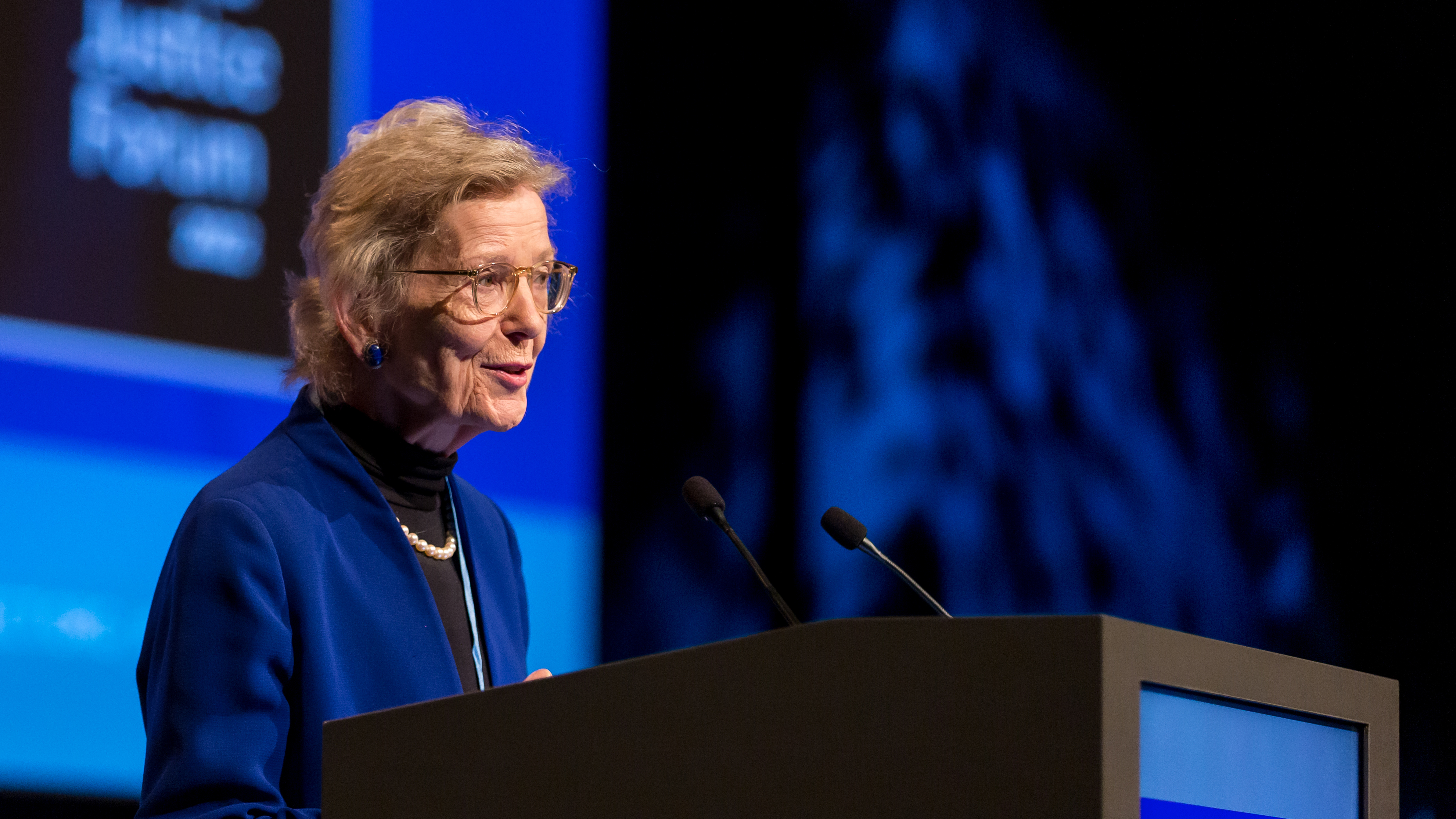 Chair of the Elders and Former President of Ireland Mary Robinson giving remarks during the Closing Plenary.
Chair of the Elders and Former President of Ireland Mary Robinson giving remarks during the Closing Plenary.
“The productive working sessions have shown us how much more there is to do until this world is fair and just, but also have highlighted the innovative solutions that can make a better future possible” - Mary Robinson, Chair of The Elders
Spotlight: Rule of Law Award
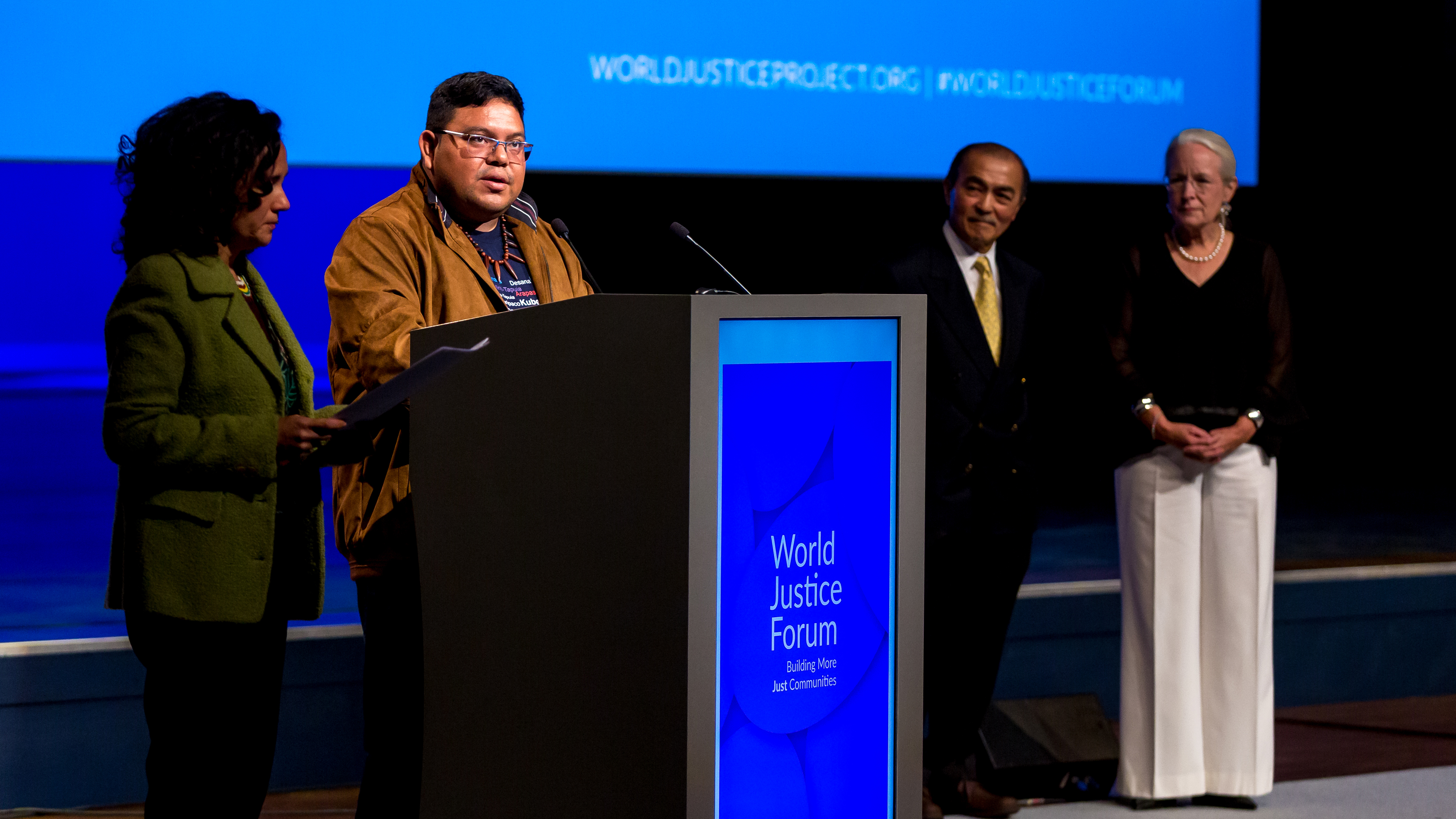 Marivelton Barroso and Juliana Radler accept the WJP Rule of Law award on behalf of Rede Wayuri.
Marivelton Barroso and Juliana Radler accept the WJP Rule of Law award on behalf of Rede Wayuri.
The World Justice Project Rule of Law Award recognizes extraordinary achievements by individuals and organizations to strengthen the rule of law in exemplary ways. The 2022 award focused on the grave challenges posed by rising disinformation. WJP announced this year’s winner as Rede Wayuri, a network of indigenous communicators working to counter disinformation and combat environmental threats in the Brazilian Amazon. Rede Wayuri comprises 55 communicators countering fake news and providing accurate information about issues of public concern in five indigenous languages and Portuguese. Since 2017, they have fought back against targeted disinformation campaigns spreading falsehoods in their communities about indigenous control of ancestral lands, environmental concerns, and, more recently, COVID-19. Their work has resulted in greater awareness and civic engagement in the region on issues such as violence against women, pandemic response, and local control of natural resources. Accepting the award on behalf of Rede Wayuri, co-founder Marivelton Barroso detailed how Rede Wayuri’s local journalism is strengthening local communities and creating “a counter-narrative to the fake news that promotes fear and contributes to the increase of violence and destruction in the Amazon.”
Identifying What Works
Watch the video below for a brief recap of the second day of the Forum.
Identifying What Works - Plenary
Moderator and Rappler journalist John Nery of the Philippines framed Day Two of the Forum as a “pivot day” to shift from defining the challenges that confront the rule of law community to focusing on identifying solutions and promising approaches. Nery led a discussion of experts from multiple disciplines who shared success stories and proposals for how to replicate and scale those successes in other contexts.
The panel began with remarks from the Honorable Martha K. Koome, Chief Justice and President of the Supreme Court of Kenya. In a pre-recorded statement, Chief Justice Koome described her country’s people-centered access to justice agenda, which aims to provide more than 20 million Kenyans full access to justice in the next five years. It includes the roll-out of small claims courts, the establishment of a special sexual and gender-based violence court, and government-provided internet centers to help citizens participate in virtual proceedings and complete e-filings. Joining in person, the Honorable Justice Hatari P.G. Waweru outlining a program that encourages judges to embrace institutional reforms and more readily accept cultural change within the Kenyan judiciary.
In discussing what works to confront rule of law challenges, several panelists raised the importance of citizen demand and political will. Ruslanbek Kuroltayevich Davletov, the Minister of Justice of Uzbekistan, described his country’s recent wave of reforms as grounded in politicians’ responsiveness to constituents. These reforms have included access to justice advances such as new administrative courts where citizens can sue state agencies for grievances. Minister Davletov also shared a successful anti-corruption strategy, where the Uzbek government eliminated broad elements of its bureaucracy to decrease the risk of graft. This included eliminating approximately 10% of the country’s legal framework and taking the licensing process online for greater transparency. Sharan Burrow, General Secretary of the International Trade Union Confederation, raised the example of Qatar. Her organization lobbied the Qatari government for many years to change their unjust labor practices, an effort that resulted in improved laws, dedicated labor courts, and state-provided remedy funds. She attributed this achievement in large part to civil society and citizen demand, which drove the government to the negotiating table.
Christoph Rojahn, an experienced international asset recovery specialist, shared that the elements required for successful asset recovery are political commitment to the process, a wide range of tools, flexibility, and a proactive view of the desired final result. He observed that asset recovery can send a powerful anti-corruption message, regardless of the amount of money involved. However, he also noted that there can be a tension between returning funds to the rightful owner and achieving full criminal responsibility for the culprit: in his experience it is difficult to do both, illustrating a dilemma at the intersection of anti-corruption, restorative justice, and retributive justice.
Ultimately, the panel agreed that meaningful solutions take time. Sharan Burrow described recent successes from the labor movement, including the International Labor Organization adoption of the first international treaty to recognize the right to work free of gender-based violence and harassment. She stressed that to sustain a labor rights campaign you must have a long-term outlook: “If it’s not a ten-year strategy, you’re not going to win.” Minister Davletov likewise observed that progress breeds high citizen expectations, which usually rise faster than institutions can deliver. To avoid losing citizen trust it is important to explain clearly the realistic pace of reforms.
Nery closed the panel by noting that as a journalist, he recognizes that the media is not in the practice of reporting on solutions, which is an area of opportunity for the field. He echoed comments from the panel that ultimately what is required for sustainable solutions is a whole-society approach where all sectors - including media, government, corporations, the courts, and labor - are pulling in the direction of justice.
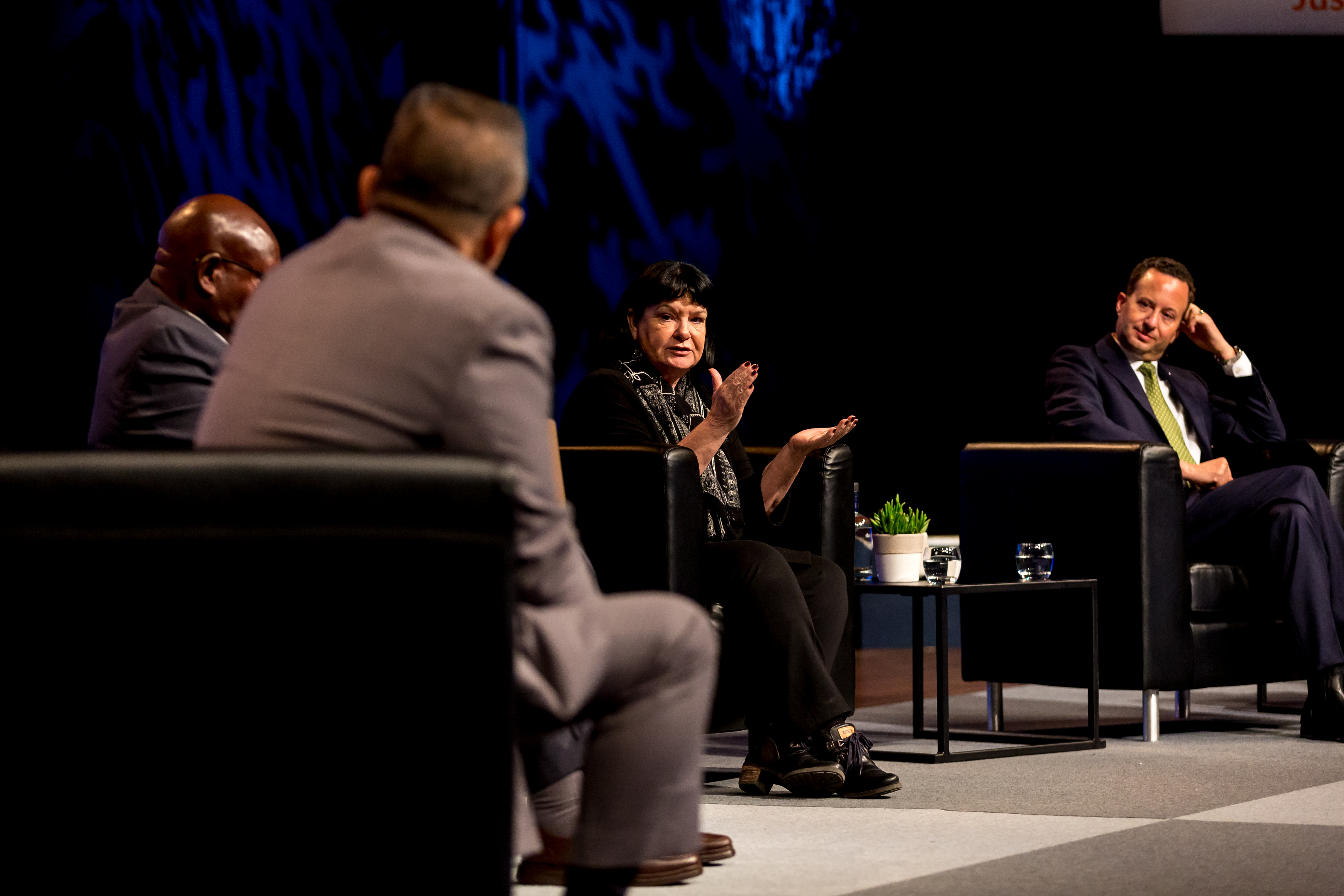 Panelists Sharan Burrow and Christophe Rojahn at the Identifying What Works plenary
Panelists Sharan Burrow and Christophe Rojahn at the Identifying What Works plenary
People-Centered Justice: How to Make it Happen Systematically? - Plenary
The Hague Institute for Innovation of Law (HiiL) hosted a plenary on “People-Centered Justice: How to Make it Happen Systematically?” moderated by HiiL’s Executive Director, Sam Muller, and featuring a panel of access to justice experts from Uganda, Nigeria, and Kenya. Muller opened the session by outlining the five core elements of people-centered justice: data collection, identifying best practices on what works, scaling game-changing solutions, creating an enabling environment, and ensuring a network of accountability.
The panelists discussed how to make people-centered justice work, drawing on unique experiences from their local contexts. One key theme was the importance of cross-sector collaboration. Gbolahan Adeniran, Partner at Awodi & Co. and former Attorney-General and Commissioner for Justice of Ogun State in Nigeria, emphasized that having a multi-disciplinary, multi-agency, public-private model is imperative because diverse stakeholders play an essential role in project design and implementation. Christine Birabwa-Nsubuga, Chief Executive Officer of the Praxis Conflict Center in Uganda, built on the importance of collaboration and communication by stating, “If we are not talking to each other, we are confusing the people we are trying to work with. If we are confusing them, we are eroding the trust that we are hoping to build.” Bringing actors together from various sectors shows the scope of, and demand for, justice and incentivizes governments to sustain justice administration efforts.
Panelists identified the importance of using data to track progress, ensure accountability, maintain citizen trust, and compile best practices. Dr. Paul Kimalu, Director of Planning and Organizational Performance for the Judiciary of Kenya, shared five expected outcomes of those seeking justice: accessibility, affordability, efficiency, timeliness, and responsive justice. Dr. Kimalu said that we must use indicators to monitor these outcomes and hold justice administrators accountable. To track accountability and satisfaction, Rachel Odoi-Musoke, Senior Technical Advisor to the Governance and Security Programme of Uganda, outlined the importance of digitizing justice processes. Digitization increases transparency, decreases corruption, and allows institutions to evaluate efficacy. The process can start simply: as Dr. Kimalu stated, “We started with an Excel… and with that Excel we transformed judicial data.”
Following the Forum, HiiL shared the six key takeaways for effective people-centered justice programming that emerged from this plenary and other Forum discussions: harness data, build trust in public systems, value informal justice systems, expand partnerships and collaboration, advocate for funding and investing, and, finally, urge courageous leadership.
Spotlight: The World Justice Challenge 2022
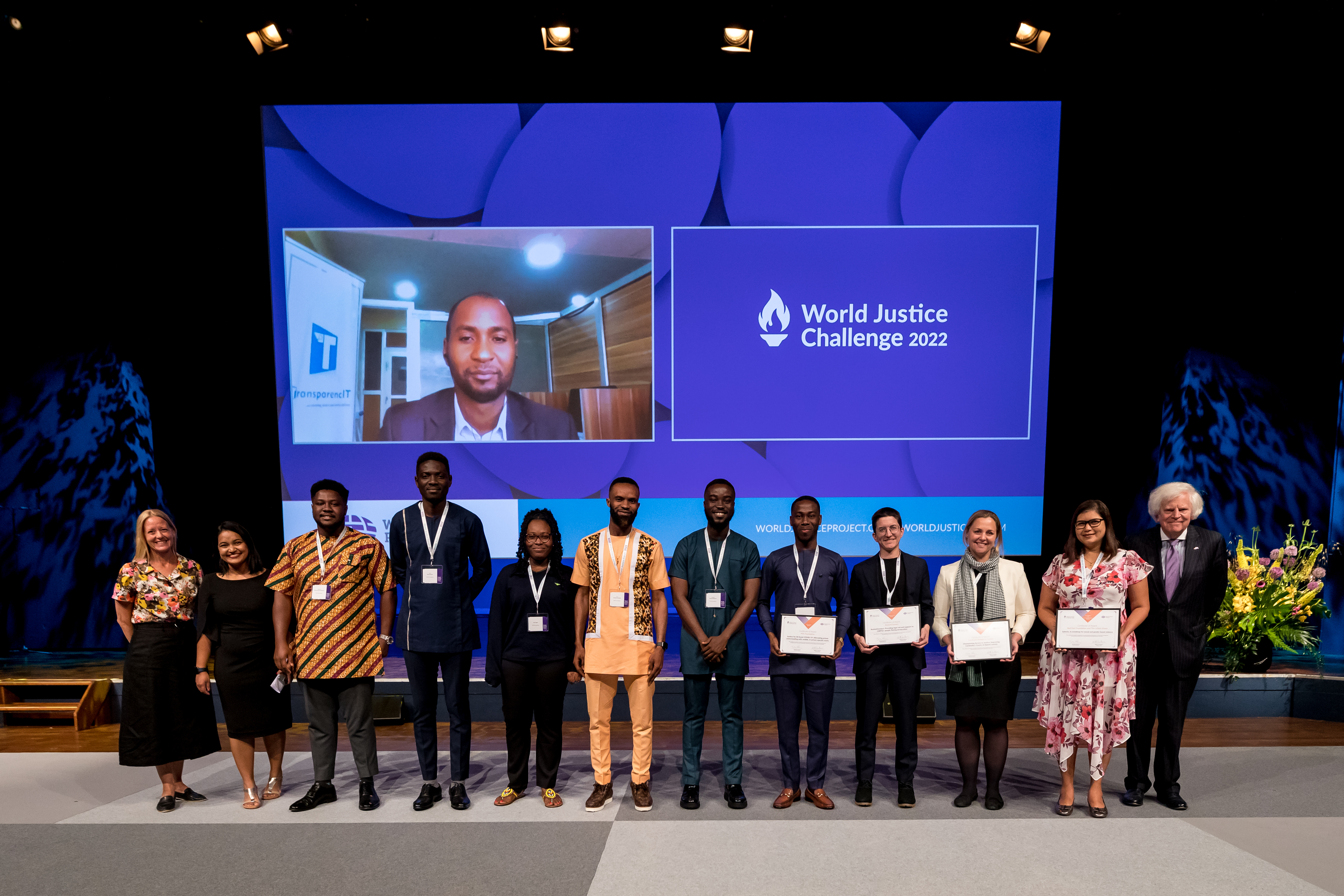 World Justice Challenge 2022 winners with judges James Silkenat, Betty Barkha, and Nikole Nelson.
World Justice Challenge 2022 winners with judges James Silkenat, Betty Barkha, and Nikole Nelson.
The World Justice Challenge is WJP’s global prize competition to identify, recognize and promote good practices and high-impact projects and policies that protect and advance the rule of law. The 2022 Challenge, a centerpiece of the Forum, was dedicated to addressing structural inequities and governance weaknesses exacerbated by COVID-19. The competition compiled a crowd-sourced evidence base for what works, raised its strategic visibility, and strengthened an emerging network of high quality, high impact rule of law organizations, projects, and policies.
This year’s Challenge invited submissions from projects in the Forum’s three thematic categories: Access to Justice; Anti-Corruption and Open Government; and Equal Rights and Non-Discrimination. WJP received an impressive 305 applications representing 118 countries, and, with help from partners, narrowed that pool to 30 finalists and ten honorable mentions. The committee selected this group of diverse, multi-disciplinary projects for their impactful, sustainable, and scalable approaches to addressing critical rule of law challenges around the world, including combating gender-based violence, checking government corruption, promoting environmental protections, safeguarding the right to information, and strengthening access to customary and informal justice. WJP invited these exceptional problem-solvers to attend the Forum in The Hague, where they presented their work at a series of World Justice Challenge Showcases, interacted with other Forum participants at their Justice Expo booths, and attended special networking and information sessions for 2022 Challenge participants and alumni of previous years’ Challenges.
On the final day of the Forum, WJP announced five winning projects, which each received a $20,000 cash prize. An esteemed panel of judges chose four of those winners: one prize in each of the Forum’s three themes and the Data for Justice Prize to the project demonstrating the most innovative use of data and evidence. A network of alumni from previous World Justice Challenge competitions selected the fifth prize winner.
The 2022 World Justice Challenge winners were:
Equal Rights and Non-Discrimination Prize: Red Dot Foundation and The Urban Vision (India)
Safecity: A crowdmap for sexual and gender-based violence.
-
Launched in response to the 2012 gang rape of Jyoti Singh on a bus in Delhi, India, SafeCity captures anonymous data about community sexual assault incidents. The platform differentiates the type of incidents/assaults, time, date, and location. Red Dot Foundation plans to connect to other community-based organizations that could implement SafeCity, with a goal of reaching 500,000 reports in 15 countries.
Access to Justice Prize: Cambodia Bridges to Justice (Cambodia)
Championing Access to Justice: Improving Cambodia's Courts of Appeals system
-
Less than 30 years ago, there were fewer than 10 lawyers in Cambodia and only one appeals court in the entire country. Cambodia Bridges to Justice provides legal aid representation in 60 priority cases in two of Cambodia’s appellate courts. Since 2012, they have helped 513 people appeal their cases, with 11% being acquitted and 85% receiving more proportional sentences.
Anti-Corruption and Open Government Prize: Transparency Information Technology Initiative - TransparencIT (Nigeria)
Trial Monitoring of Corruption Cases: Creating monitoring systems, an online corruption case database, and special anti-corruption courts
-
Corruption is Nigeria’s greatest obstacle to economic development; it also often goes unpunished due to slow dispensation of justice and corruption within the justice system. TranparencIT’s Trial Monitoring of Corruption Cases project has helped reduce the average duration of corruption trials from eight years to three to four years, while successfully advocating for special anti-corruption courts that are even speedier.
Data for Justice Prize: InReach (Global)
InReach: Providing legal aid and support to LGBTQ+ people fleeing persecution
-
Formerly known as AsylumConnect, InReach is the first web and mobile platform designed to protect LGBTQ+ people. InReach supports those fleeing persecution by matching asylum seekers, refugees, and undocumented immigrants with verified legal, medical, mental health, and social service providers in the United States, Mexico, and Canada.
Alumni Vote Prize: POS Foundation (Ghana)
Justice for All Amid COVID-19: Alleviating prison overcrowding with mobile, in-prison special courts
-
POS Foundation’s work addresses several challenges in Ghana’s criminal justice system: inaccessibility of fair trials, inadequate legal education and representation, and legislative loopholes. By creating mobile, in-prison special courts to adjudicate prisoner cases throughout the country, they have helped to nearly halve Ghana's pre-trial prison population.
“Participating in the World Justice Challenge has provided our organization and project the visibility to amplify our work and network with other global justice experts. As one of the finalists and winners, the Challenge has validated our work and reinforced that we are on the right path to seeking justice and building just communities.” - Abbas Inuwa, Transparency Information Technology Initiative (TransparencIT), Nigeria
Offsite Working Sessions
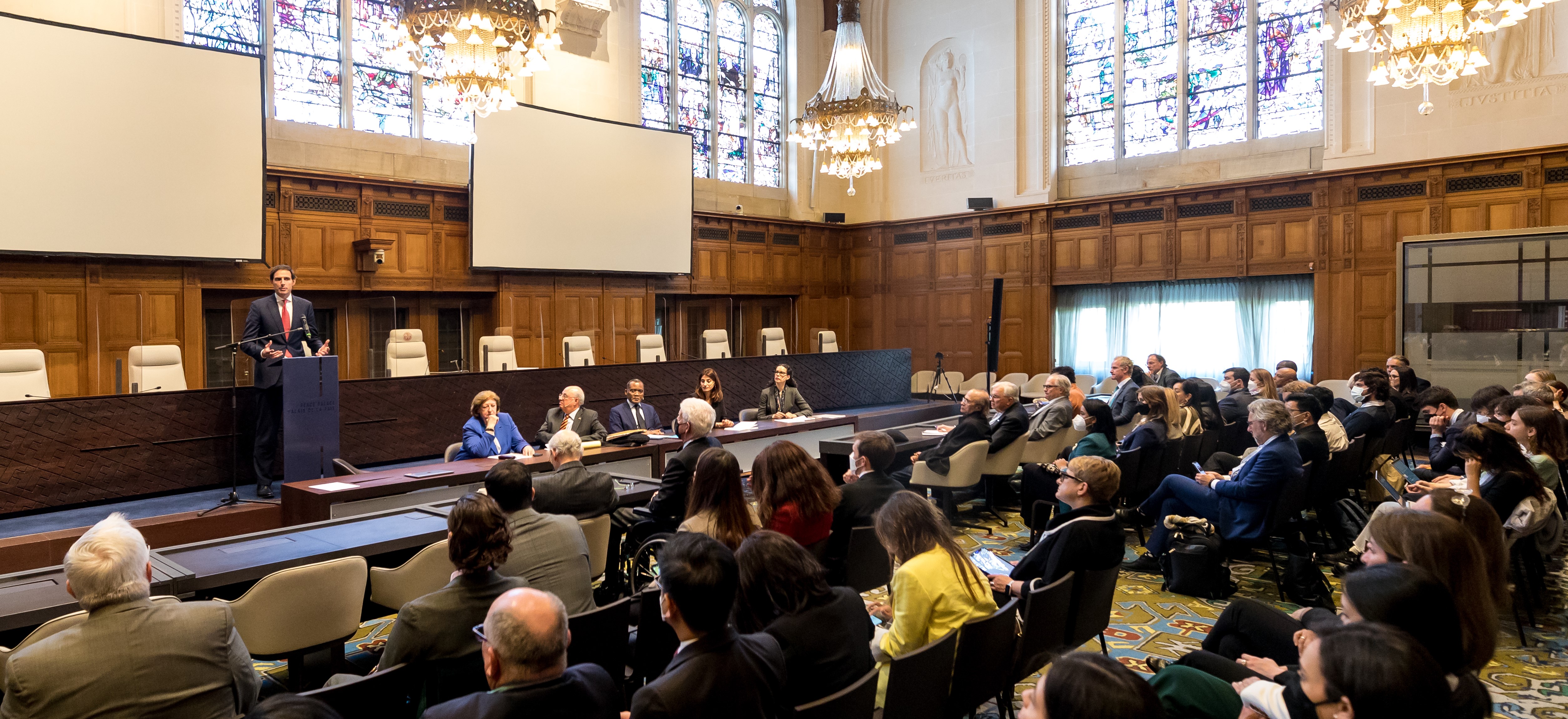 Dutch Minister of Foreign Affairs Wopke Hoekstra provides remarks during the working session "Addressing the Enforcement Gap: The Proposal for an International Anti-Corruption Court" organized by Integrity Initiatives International and hosted at the Peace Palace
Dutch Minister of Foreign Affairs Wopke Hoekstra provides remarks during the working session "Addressing the Enforcement Gap: The Proposal for an International Anti-Corruption Court" organized by Integrity Initiatives International and hosted at the Peace Palace
On Day Two the Forum took working sessions off-site to organizations throughout The Hague, where partners showcased local solutions and their global interlinkages with rule of law challenges. During the sessions a few key messages emerged:
- The importance of localization and community participation. To tackle justice, discrimination and corruption issues, several sessions discussed the need to apply the SDGs locally, right down to the municipal level, and various models for doing so. In a session organized jointly by the Hague Humanity Hub, Carnegie Mellon University, and UN Association-National Capital Area, speakers shared innovative approaches to SDG localization across six cities. Lessons included the importance of involving the input and expertise of the local community from the outset, enlisting community perspectives to help interpret data points, and modifying SDG targets and indicators as needed to suit the local context. A visit to the Dutch National Ombudsman’s office provided another example of localization in action, illustrating how ombuds offices deal directly with implementation of local human rights and government accountability issues that cut across many SDGs. Above all, these off-site sessions stressed the principles of “Do No Harm” and “Nothing About Them Without Them” as non-negotiable for meaningful, rights-based, and locally appropriate solutions.
- The role of the private sector. Multiple sessions looked to the business community to contribute to rule of law solutions. In “Justice-By-Design: How to Integrate Justice into Technology?” speakers gathered at Leiden University to discuss a new model of ethical AI that “makes justice the default setting.” This process addresses bias, privacy, and security issues in product design - rather than waiting until technology products have already begun to do harm - to consider these issues. Sessions also discussed opportunities to demonstrate to business leaders that a strong human rights environment will be good for their bottom line and that integrating rights considerations into product development will prevent costly issues in the deployment phase.
- Corruption’s influence on development and citizens’ quality of life. In a recurrent theme throughout the Forum, speakers discussed how both grand corruption and private sector conduct have significant impacts on realizing the SDGs. As was noted during the “Proposal for an International Anti-Corruption Court” presentation at the Carnegie Peace Palace, the World Economic Forum estimates that the total cost of corruption is equal to 5% of global GDP. In a session on engaging business in transforming governance, hosted at VNO-NCW, speakers explored the UN Global Compact’s SDG 16 Business Framework, which supports business to contribute to reducing corruption, achieving SDG 16, and realizing peace and justice for all.
Links between corruption and disrimination were highlighted in these sessions as well; as Dutch Foreign Affairs Minister Wopke Hoekstra observed, countries with the highest rates of corruption also tend to have poor human rights records. This further corresponds to patterns of crackdowns on journalists and civil society, as corrupt leaders attempt to shrink civic space and eliminate transparency mechanisms that might hold them accountable. In one particularly moving testimony about corruption’s grave consequences, Lebanese youth activist Serena Ibrahim told the story of the 2020 Beirut port explosion, the third largest non-nuclear explosion in history, which is widely believed to have resulted from a corrupt management structure designed for elite self-enrichment. She told the room, “I knew that corruption kills, but I never imagined that it can devastate or erase a capital in one second.”.
Spotlight: Celebrating Justice Through the Arts
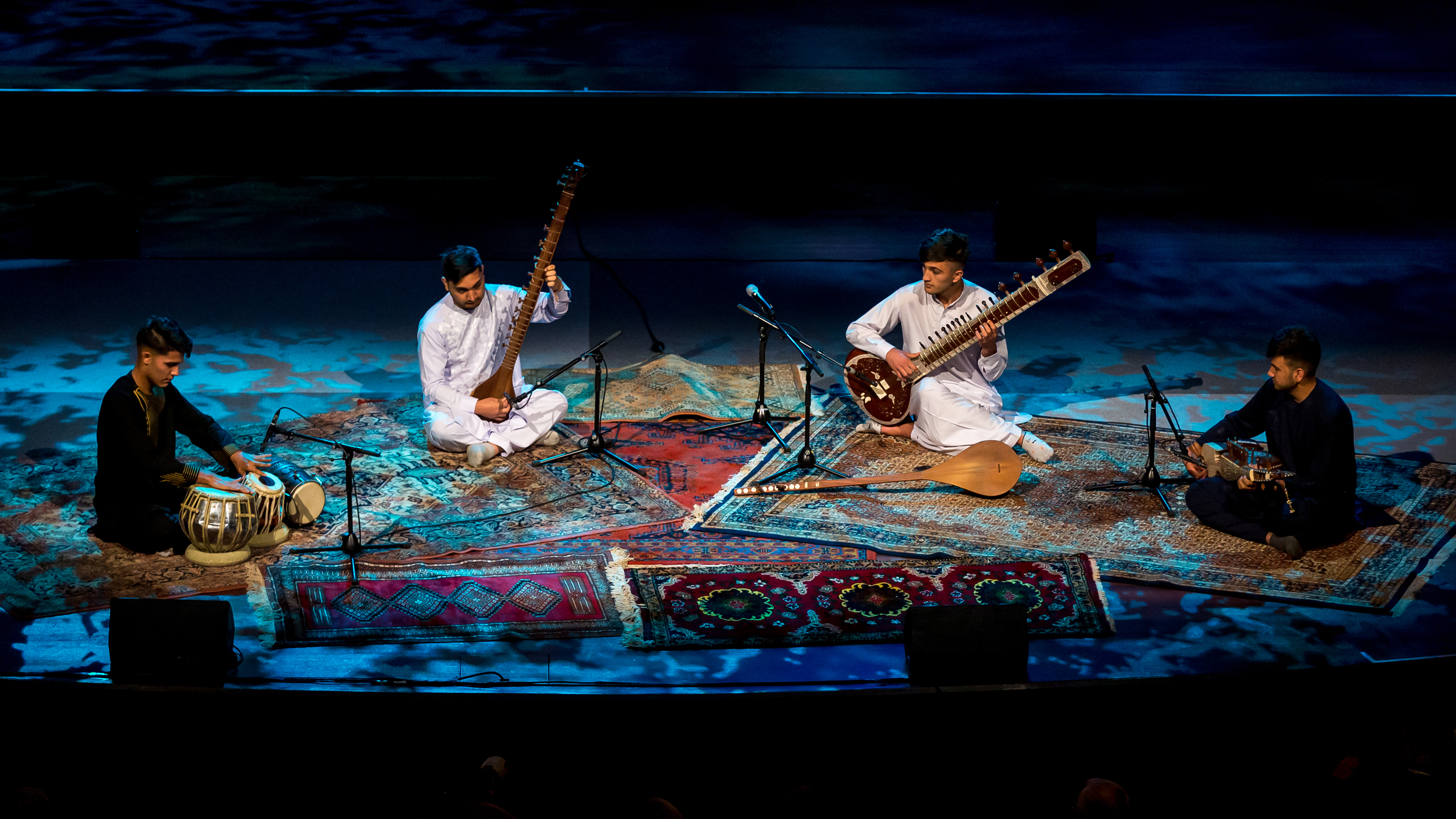 Members of the Afghanistan National Institute of Music (ANIM) perform during the plenary session The Power of Expression: Presentation of the WJP Rule of Law Award and a Celebration of Justice through the Arts.
Members of the Afghanistan National Institute of Music (ANIM) perform during the plenary session The Power of Expression: Presentation of the WJP Rule of Law Award and a Celebration of Justice through the Arts.
The arts have a unique power to help us process complex issues in new ways and encourage dialogue, understanding, and healing. The Forum featured several arts and cultural performances that illuminated a diversity of justice issues around the world and inspired participants to imagine new dimensions to our shared pursuit to build more just communities. These events included:
- A performance by the Afghanistan National Institute of Music (ANIM), the country’s first and only co-educational music institution, which since 2010 offered instruction in both traditional Afghan and Western music. Following the Taliban’s resurgence to power in 2021, the school’s students and faculty were forced to flee their homeland for asylum in Portugal to protect their personal safety and musical heritage. ANIM’s Founder and Director, Dr. Ahmad Sarmast, delivered moving remarks imploring the Forum audience to help restore rights, including musical rights, to all Afghan people. Four young musicians from the ANIM Afghan Traditional Instruments Ensemble then took the stage to play several pieces on the rubab, sitar, danbura, tanbur, and tabla.
- A modern dance and acrobatics performance by the Rotterdam-based Codarts dance troupe. They shared two pieces with the Forum audience: “The Speech,” set to the famous final speech from Charlie Chaplin’s film “The Great Dictator”; and “Brace for Impact,” which explored the importance of working hand-in-hand to build a better future.
- A presentation of the jazz opera “Dear Erich,” inspired by composer Ted Rosenthal’s discovery of over 200 letters written between 1938 and 1941 by his grandmother, trapped in Nazi Germany, and his father Erich, a Jewish scholar who had escaped as a refugee to the United States. By probing themes of discrimination, borders, immigration and refugees, the opera raises moral dilemmas and explores topics that connect deeply with the Forum’s themes. Ted Rosenthal and librettist Lesley Rosenthal shared with the Forum audience a live piano performance, video excerpts of the staged opera, and a discussion of how Dear Erich’s messages reflect the state of the rule of law today.
- A screening of WJP researcher Roberto Hernandez’s docuseries “Reasonable Doubt: A Tale of Two Kidnappings.” The series follows the cases of four men in Mexico who face criminal charges for kidnapping, and in doing so exposes the deep corruption and violence that pervades the country’s justice system. The screening was followed by a panel discussion on what the film reveals about critical shortcomings in legal defense frameworks globally and what justice changemakers on the frontlines are doing to address them.
Recommendations, Commitments and Action
Watch the video below for a brief recap of the third day of the Forum:
Ruth Bader Ginsburg Legacy Keynote Conversation with Sherrilyn Ifill
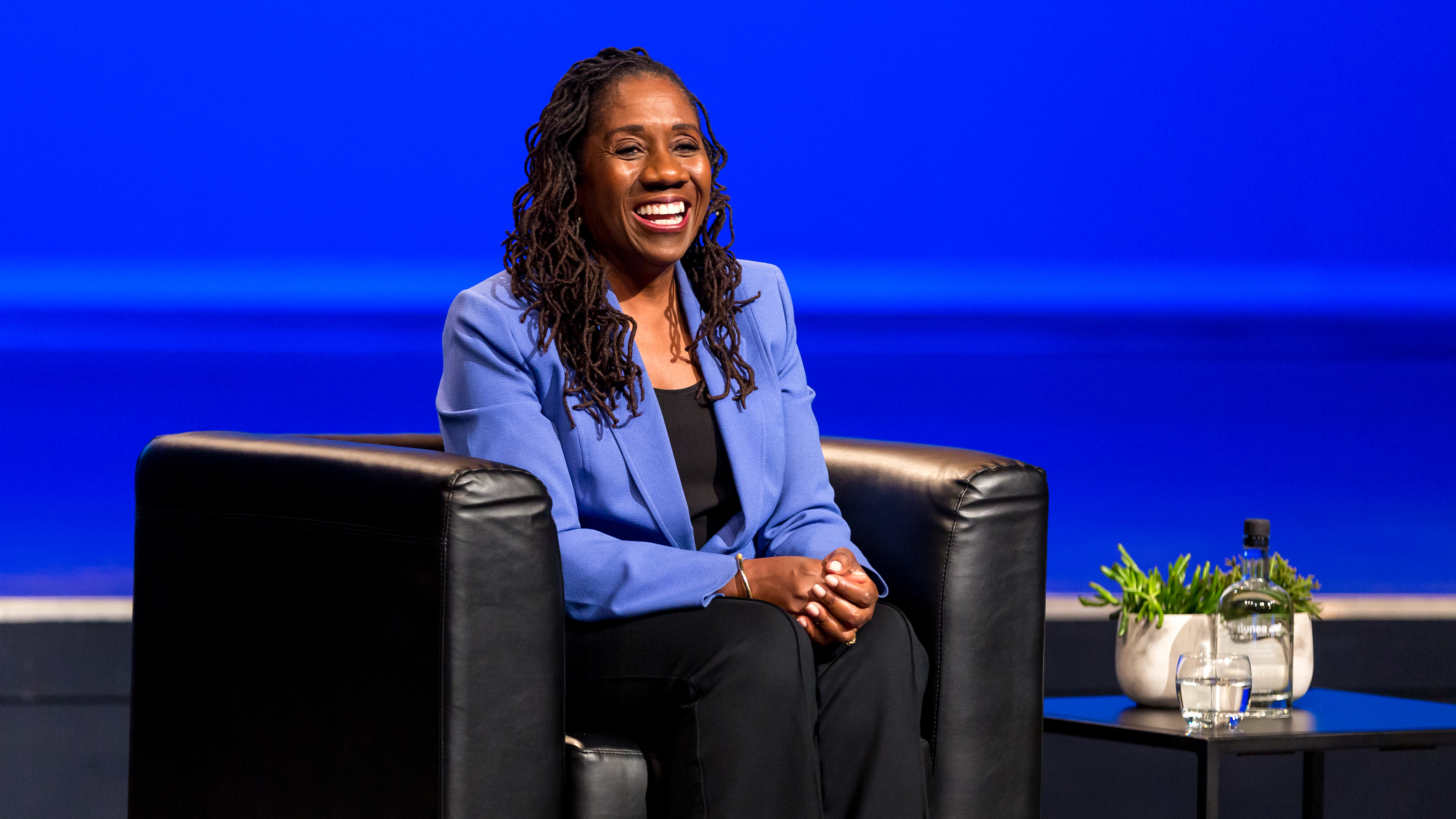 President and Director-Counsel Emeritus of the NAACP Legal Defense Fund Sherrilyn Ifill giving remarks during the Ruth Bader Ginsburg Legacy Keynote Conversation.
President and Director-Counsel Emeritus of the NAACP Legal Defense Fund Sherrilyn Ifill giving remarks during the Ruth Bader Ginsburg Legacy Keynote Conversation.
Day Three of the Forum began with the “Ruth Bader Ginsburg Legacy Keynote,” a plenary session honoring former U.S. Supreme Court Justice Ginsburg’s lifelong work in service to justice, equality, and the rule of law, and in recognition of her inspiration to WJP's mission and work. Justice Ginsburg served as a WJP Honorary Chair from its founding and attended three Forums, delivering keynote talks in 2013 and 2017. The session featured a keynote address from Sherrilyn Ifill, President and Director-Council Emeritus of the NAACP’s Legal Defense Fund. A visionary leader on racial justice and equality in the United States, Ifill has influenced national issues as a prolific scholar, advocate, and advisor.
Judge Margaret McKeown, Judge of the United States Court of Appeals for the Ninth Circuit, began the session by highlighting Justice Ginsburg’s lifelong commitment to the rule of law, both domestically by fighting for a more just system for girls and women in the United States, and internationally through her commitment to the global movement for justice. Judge McKeown welcomed Ifill to the stage as a leader who represents Justice Ginsburg’s legacy, and as a “woman of action as well as ideas.”
Ms. Ifill spoke about Justice Ginsburg’s long career as a civil rights activist and how lessons from her work can be used today to uphold the rule of law at home and abroad. She drew comparisons between Justice Ginsburg and Justice Thurgood Marshall, civil rights activist and the first Black Supreme Court Justice, noting that Justice Ginsburg dismantled the legal framework of gender discrimination and pay disparity just as Justice Marshall had dismantled the framework of legal apartheid through the famous Brown vs. Board of Education case. Ifill explained that as the only two civil rights lawyers ever appointed to the Supreme Court, Justice Ginsburg and Justice Marshall brought a critical understanding of systemic discrimination to their legal work, and called for the entire legal ecosystem to ensure that rule of law is framed and guided by how the law actually works in the lives of those most marginalized. Acknowledging the troubling legal landscape many countries face today, Ifill reminded the audience that legal systems are shaped not only by law, but by community activists and organizers, economic cycles, war and peace, corruption and bribery, and a multitude of other factors that must be constantly taken into consideration.
To conclude the session, Lysa John, Secretary General of CIVICUS, joined Ifill on stage to discuss her work. Ifill called for a commitment to sustained learning in the legal profession, encouraging those in the rule of law field to continuously engage with activists, scholars, researchers, and the communities affected by the law itself. They spoke about the importance of regulating big tech companies, the role young activists have in pushing for a better future, and the different ways the United States can learn from the international community. To conclude the session, Ifill reflected on the arc of her own family’s past as an inspiration for her work, because it proves that true change is possible. Thanks to the work of civil rights lawyers, she and her family could be considered full citizens in a country where that was once not possible.
“[The Forum] is a platform that brings together leaders from all over the world during these challenging times. We had the opportunity to look at ourselves from the outside perspective, to understand our strengths and weaknesses.” - Makhabat Tazhibek Kyzy, Public Foundation New Media, Kyrgyzstan
Recommendations, Commitments, and Investments to Advance Justice and Rule of Law - Plenary
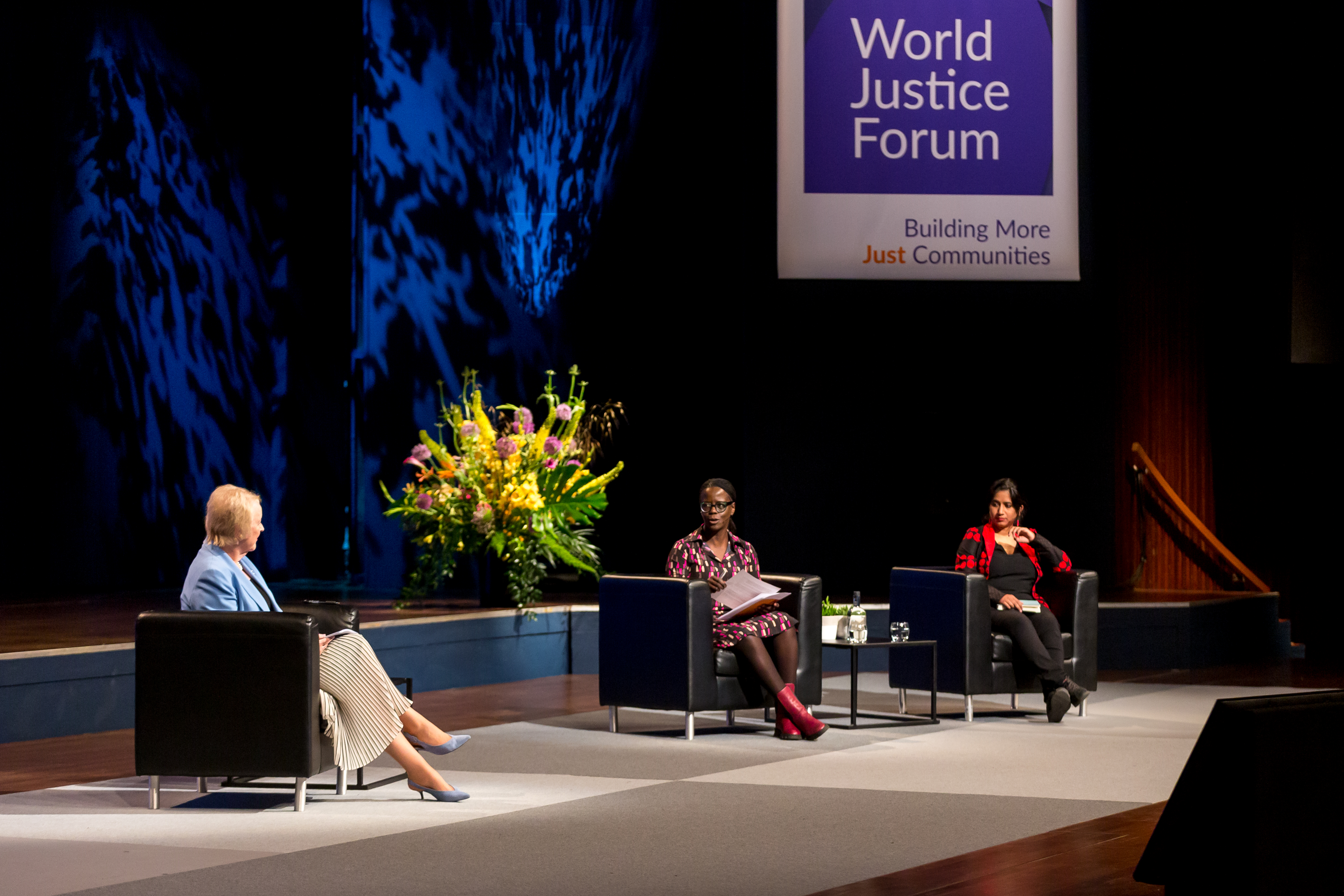 Panelists at the Recommendations, Commitments, and Investments to Advance Justice and Rule of Law plenary
Panelists at the Recommendations, Commitments, and Investments to Advance Justice and Rule of Law plenary
The “Recommendations, Commitments, and Investments to Advance Justice and Rule of Law” plenary brought together diverse perspectives on how to take action for the rule of law. Moderator Jan Beagle, Director-General of the International Development Law Organization (IDLO), observed that the rule of law status quo is unsatisfactory, citing that prior to the pandemic 5.1 billion people had unmet justice needs. Lysa John, Secretary General of CIVICUS, underscored that sentiment by sharing that only “3% of the world’s population currently lives in contexts where you can freely express your civic freedoms.” The conversation then turned to the actions required to meet the urgency of the moment.
A number of speakers emphasized the need for a more comprehensive, multi-stakeholder approach. James Walsh, the Principal Deputy Assistant Secretary at the U.S. Department of State, contended that U.S. policy has “too often approached rule of law reforms in a siloed manner” rather than through a holistic approach that targets the “foundational challenges” to the rule of law. To transform U.S. policy, Walsh noted that the Biden administration developed a national strategy on countering corruption to foster inter-agency cooperation and hosted the first Summit for Democracy, which brought together key international stakeholders and helped establish over 700 commitments. János Bertók, the Deputy Director of the Public Governance Directorate at the OECD, echoed the value of multilateral cooperation and shared recent OECD efforts to understand how to build trust in public institutions.
On data, the panelists all agreed that data and technology can offer promising opportunities to identify justice gaps and increase transparency, albeit with careful attention to the risks and challenges these approaches bring. Atieno Odhiambo, Director of the Legal Empowerment Fund, cautioned that data collection often neglects the prominence of informal justice systems; in Kenya, for example, 90% of disputes are resolved through informal justice. Bertók considered the challenge of working with an increasingly large amount of data as “one of the biggest inefficiencies” in the rule of law space.
The panelists noted that the heighted demand for rule of law investment has unfortunately coincided with a reduction in international financing for rule of law initiatives. In the aftermath of Russia’s invasion of Ukraine and the corresponding calls by European leaders to defend democracy, John noted that European governments actually redirected global rule of law investment funds to the conflict. John and Odhiambo called for rule of law efforts to start from the bottom up, ensuring that rule of dialogue includes marginalized communities and that local leaders are in a strong position to shape rule of law initiatives and hold governments accountable for their rhetorical commitments. Otherwise, John warned, the 2020s will be “the decade of agitation,” characterized by protest without effective policy responses.
Working Sessions
The Forum’s final working sessions on Day Three featured forward-looking conversations on securing new commitments, pursuing actionable recommendations, and leveraging diverse partnerships. Notable trends included:
- The vital contributions of young people. Several sessions featured discussions about how to realize meaningful intergenerational alliances with children and youth. This included calls to re-imagine how children are included in justice processes by making justice more child-sensitive, and considering how young people have important contributions to make on justice issues that disproportionately impact them, such as gun violence, online threats, and environmental disasters. In the session “Children and Youth at the Table! Intergenerational Action in Realizing Justice for All,” speaker Angela Vasile urged, “We should not tell children how the [justice] system works, but we should learn from them what we can do to improve the system.” Other sessions discussed young people as leaders in the climate change movement, especially in the Asia-Pacific region, and the Juliana v. United States lawsuit where 21 young activists sued the government over climate change inaction. Recognizing not all youth have equal access to justice, speakers also described how intersecting identities pose additional barriers for certain communities. LGBTQ+ and indigenous rights activists Shaneel Lal asked, “How do you get justice when the systems built to provide you with justice deem you a criminal simply for existing?” A key take-away from these sessions was that young people should make waves and speak truth to power, even when it is uncomfortable.
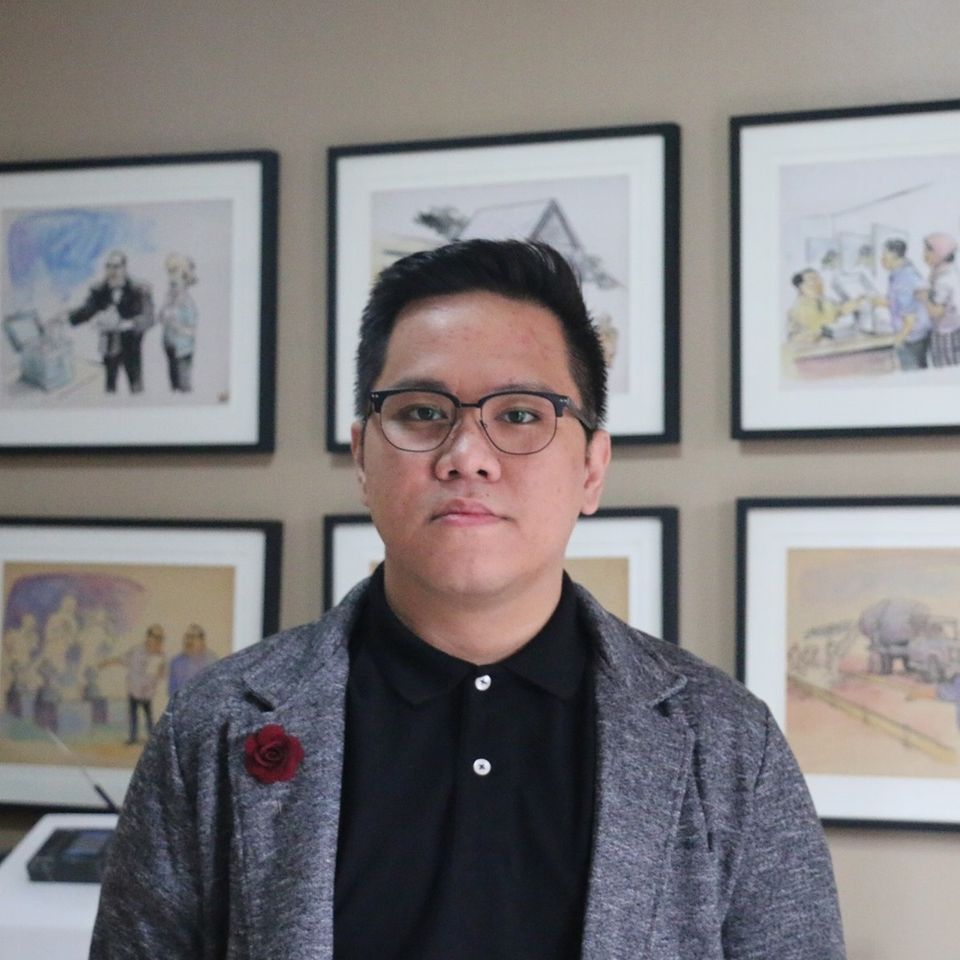
“[The Forum] lit a fire in me to further improve how we do advocacy work in the country and in the region, especially as we prepare to face new threats and challenges against human rights and rule of law.” - Vino Lucero, Pathfinders Young Justice Leader from the Philippines
- How accountability institutions curb corruption and protect civic space. This theme included discussions about how both independent government agencies and accountability mechanisms within corporations can be sources of democratic integrity. Session organizers offered strategies to take action against closing civic space, such as multi-sector collaboration to build momentum for reforms, media engagement, strengthening judicial autonomy, and building relationships with regional and global allies. The session, “Building Partnerships Across Society to Protect Civic Freedoms and Democracy,” recommended companies adopt internal accountability mechanisms, as outlined in the “Shared Space Under Pressure” framework, to ensure their investments do not violate human rights or contribute to governments targeting civic activists. A conversation about Supreme Audit Institutions (SAIs) stressed that these bodies must remain wholly independent in order to successfully monitor corruption; and panelists noted that many SAI methodologies could be applied to other oversight institutions. In this session and others, speakers stressed that citizen participation in accountability processes should be the focus of a mutually-reinforcing approach for opening civic space.
- The role of the law in advancing equal rights. Many working sessions featured recommendations and strategies for how to effectively use the law to protect vulnerable groups and seek accountability for discriminatory policies. A session on gender justice detailed some of the avenues lawyers have at their disposal to fight discrimination, such as strategic litigation, advocating for changes to court procedures that disadvantage women, and legislative and policy reform. Several sessions addressed legal avenues to secure climate justice by holding polluters accountable to environmental regulations. In a session organized by the American Bar Association Section of Environment, Energy, and Resources, environmental lawyer Zhang Jingjing shared examples from her work to secure Chinese companies’ compliance with environmental laws overseas, including innovative legal strategies to use local Chinese environmental laws to hold Chinese investors accountable for misconduct in Africa. As several speakers noted, there is increasing overlap in climate change cases and international human rights law, as climate change interferes more and more with the fulfillment of basic human rights. An additional legal avenue discussed throughout the day was a comprehensive approach to legislating anti-discrimination, replacing the current piecemeal approach to counter discrimination with a more effective strategy to combat discrimination and ensure rights for all.
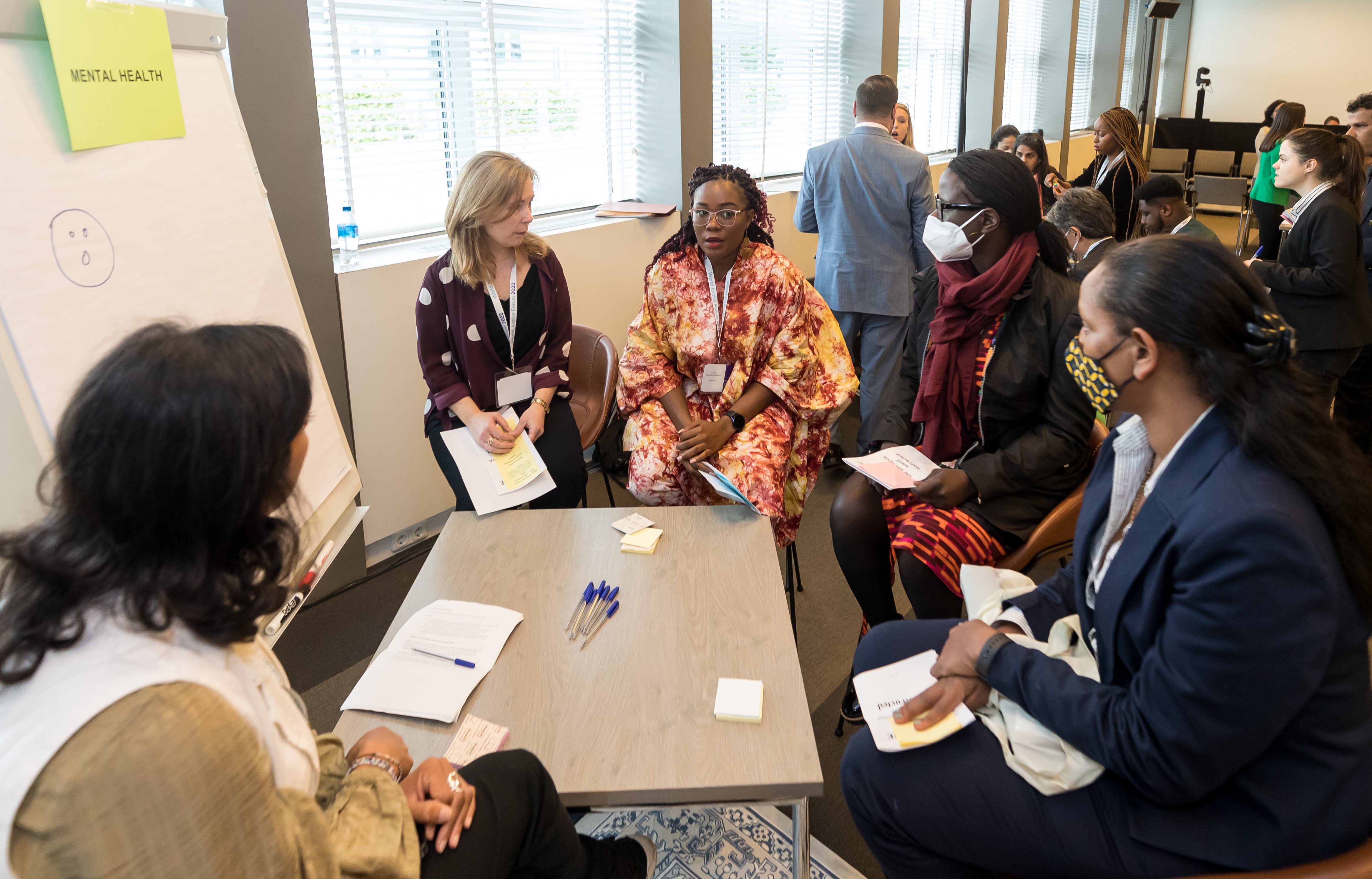 Participants at the working session "Promoting Non-Discriminatory and Inclusive Access to Justice for All Children: A Simulation" hosted by Terre des Hommes, Baker McKenzie, and the Global Initiative on Justice with Children.
Participants at the working session "Promoting Non-Discriminatory and Inclusive Access to Justice for All Children: A Simulation" hosted by Terre des Hommes, Baker McKenzie, and the Global Initiative on Justice with Children.
Closing Plenary
World Justice Project Executive Director Elizabeth Andersen began the Closing Plenary by reflecting on the inspiring week participants had shared and highlighting the importance of working collaboratively across sectors to build more just communities. Andersen then introduced Brad Smith, President and Vice Chair of Microsoft, who reinforced the importance of defining rule of law and measuring accountability through instruments such as WJP’s Rule of Law Index. He also called on the international community to work together to address the crisis facing global rule of law, as demonstrated by Russia’s invasion of Ukraine.
Next, Andersen introduced the Minister of Justice of Niger, His Excellency Mohamed Ikta Abdoulaye, spoke about Niger’s Justice Consultation process, which Niger launched in 2012 as part of a ten-year plan to strengthen and democratize the country’s justice and human rights policies. Minister Abdoulaye raised this as an example for the international community to hold justice systems accountable and increase equitable access to justice. UN Under-Secretary General Usha Rao-Minari then joined to tie the goals of the Forum to the larger SDG agenda, stating that “to make justice a reality, we need to listen more to the people, learn from our mistakes, and share best practices.” Under-Secretary Rao-Minari emphasized that human rights and justice for all are the bedrock of development. David Beasley, Executive Director of the World Food Program, put the stakes of our communal efforts to advance the rule of law into the context of the global hunger crisis. Beasley outlined how conflict, climate change, and the pandemic have exacerbated this crisis and observed that to emerge from the current situation, we must adopt a cross-sector agenda to create economic opportunity, build just communities, and uphold the rule of law.
Finally, Andersen welcomed Mary Robinson, Chair of The Elders and former President of Ireland, to the stage. Robinson reflected that the global climate crisis and the pandemic have shown just how dangerous a lack of justice and equality can be, and that we must move forward by including all voices, especially youth voices and the voices of the most marginalized. She concluded saying, “I leave this Forum feeling energized and inspired … Together we can turn our learning into action. We can ensure a kinder, fairer, more just world for all. And we must.”
To conclude the conference, WJP honored the wisdom of its late Honorary Chair Archbishop Desmond Tutu through a video tribute. The video featured Archbishop Tutu’s reflections on the rule of law, in which he noted, “The rule of law matters to all of us, to the entire human family. Wherever we live, however we look, regardless of ethnicity, gender, geographic location, or class - strengthening the rule of law is an essential ingredient to enhance justice, peace, and economic and social progress."
WJP Co-Founder and CEO Bill Neukom provided closing remarks, emphasizing the importance of working together to advance the rule of law around the world. He reminded participants that none of us is ever alone in the fight for a more just world, and that we have achieved the unimaginable in the past. Neukom adjourned the conference with an essential message: “If your cause is just, nothing is impossible. Our cause is just. So you, and we, all of us, have work to do. It’s good work, and just work, and there is lots and lots of it. So let’s get on with it.”
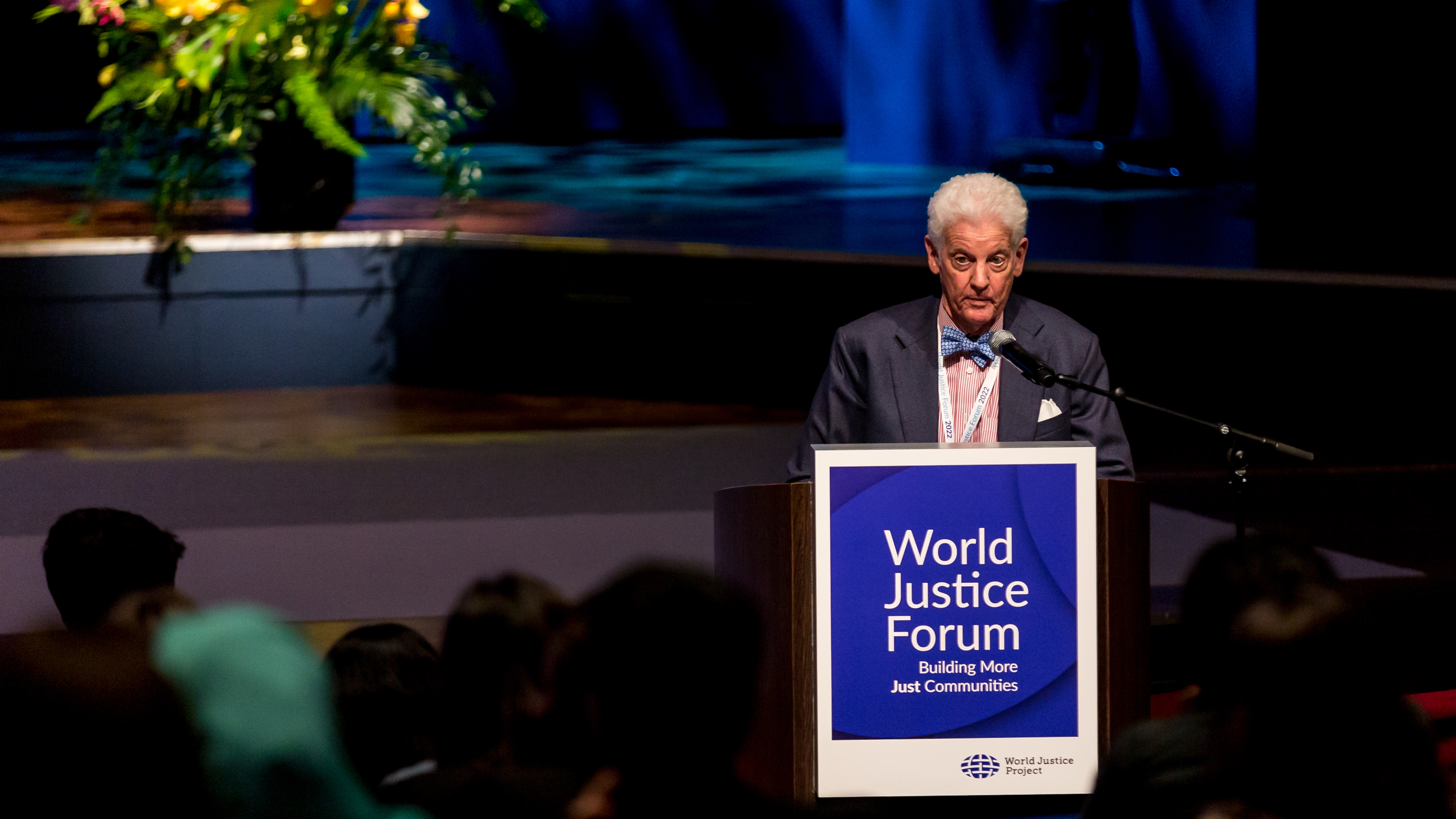 World Justice Project Co-Founder and CEO Bill Neukom delivers farewell remarks at the Closing Plenary.
World Justice Project Co-Founder and CEO Bill Neukom delivers farewell remarks at the Closing Plenary.
Spotlight: Final Statement on Building More Just Communities
During the Closing Plenary, WJP’s Executive Director Elizabeth Andersen presented the Forum’s final statement, drafted collaboratively with WJP’s Forum partners to capture key insights and priorities for strengthening the rule of law that emerged from the week’s activities. These include a commitment to rescue the rule of law from its current downward trajectory, a call for re-doubled investment and political will towards adopting a people-centered justice agenda, and confirmation in our shared conviction that the 2030 Agenda for sustainable development, and particularly the fulfillment of SDG16, remains the best path forward for all countries. The statement called on leaders and changemakers gathered at the Forum and beyond to build on momentum to actively defend and advance universal principles of fair and accountable governance and fundamental rights in preparation for the Sustainable Development Goals Summit to be held in September 2023.
The final statement also articulates notable priorities in each of the Forum’s three themes:
On anti-corruption and open government, the statement:
- Urges states to agree to a common legal definition of grand corruption and work towards enforcement that includes mandatory beneficial ownership transparency and swift recovery of stolen assets.
- Highlights the linkages between corruption and discrimination, and recommends strengthening institutional safeguards such as supreme audit institutions and independent anti-corruption agencies as a top priority.
- Notes that states must collaborate with private sector, media, non-profits, technology, and other sectors for meaningful progress on corruption challenges.
To achieve access to justice for all, the statement:
- Emphasizes people-centered justice as the key to restoring the social cohesion and trust required to build more just communities.
- Recommends regular collection, analysis, and use of people-centered data to identify common justice problems and understand what works to prevent and resolve them.
- Calls on governments, the justice sector, legal professionals, and entrepreneurs to support an enabling environment for justice innovation that includes legal empowerment, customary and informal justice practices, and responsible use of technology.
To confront discrimination, the statement:
- Reaffirms that all human beings are born free and equal in dignity and rights, and outlines several measures to guarantee these rights.
- Calls for the adoption and implementation of comprehensive anti-discrimination legislation, a holistic emphasis on gender justice, and the use of an “equality by design” policy-making approach to help ensure that governments meet their international human rights obligations.
- Advises states to work in consultation with civil society to counter the shrinking of civic space and uphold rights to assembly, association, and expression.
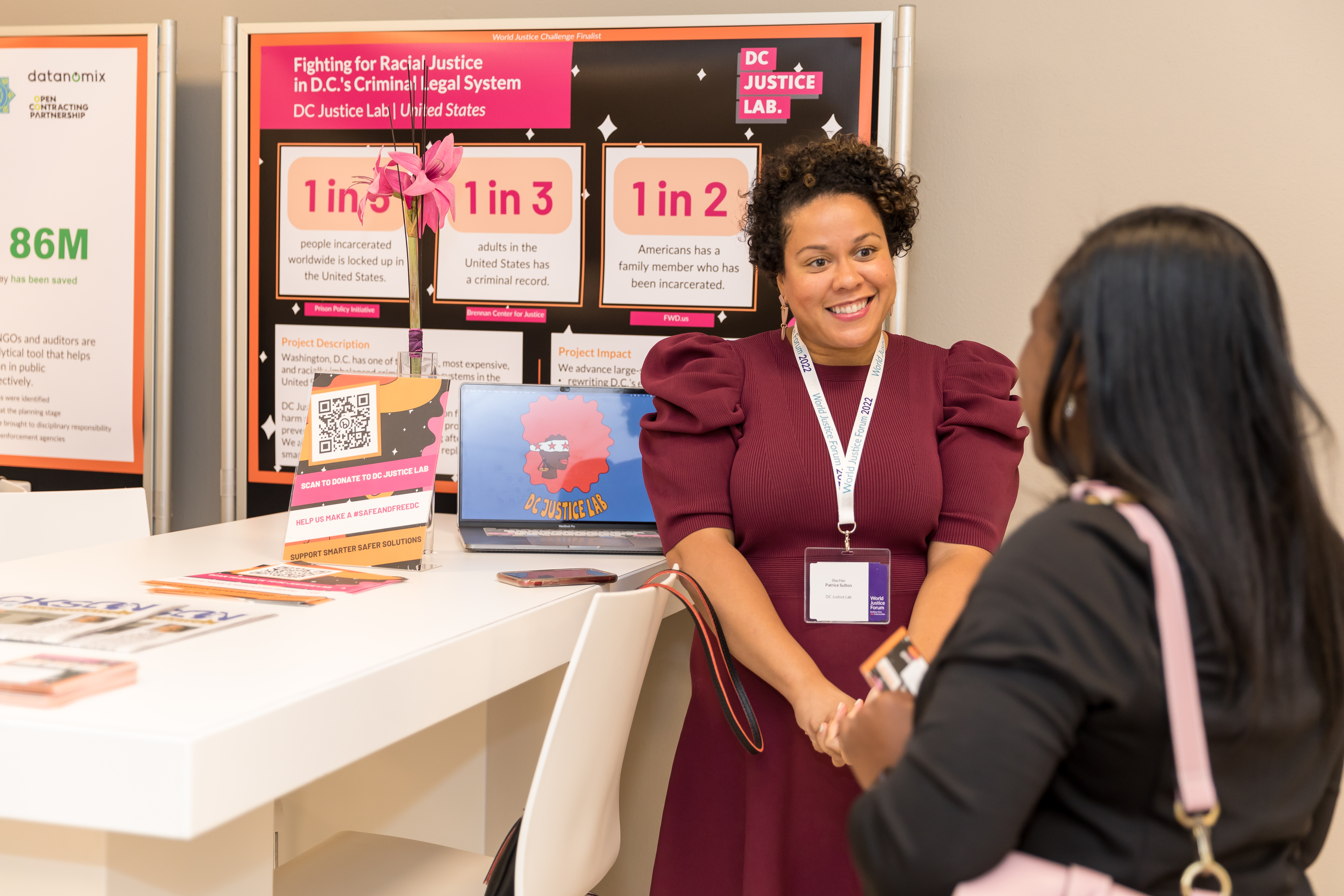 World Justice Challenge finalist representative Patrice Sulton from DC Justice Lab (United States) speaks with a Forum attendee in front of their Justice Expo booth.
World Justice Challenge finalist representative Patrice Sulton from DC Justice Lab (United States) speaks with a Forum attendee in front of their Justice Expo booth.
“What I didn’t expect was to see so many effective and transformative solutions that had already been implemented across the globe. The Justice Expo was not a showcase of proposals, suggestions, or hypotheses. It was an inventors’ forum: a spectacular display of evidence that dramatic change and global healing are achievable through innovation.” - Patrice Amandla Sulton, DC Justice Lab, United States
Outcomes and Next Steps
The commitments outlined in the Final Statement were bolstered by numerous complementary outcomes that emerged directly from the Forum. As a global platform to establish and advance rule of law priorities, the Forum served as an important and strategic venue for partners to launch initiatives, announce partnerships, release new research, and take other concrete actions toward building more just communities. Some of these outcomes and actions included:
- The adoption of the Justice Action Coalition’s Justice Appeal 2023, which calls on all countries to pivot to people-centered justice to achieve the promise of SDG16. The Justice Action Coalition, a multi-stakeholder group of governments and organizations committed to championing access to justice, held its second Ministerial Meeting on the eve of the Forum, during which 19 governments adopted the Justice Appeal. This was followed by a convening of senior officials and partners at the Forum to take forward the decisions of the Ministerial meeting, and a working meeting at the close of the Forum to identify next steps for the Justice Action Coalition’s Joint Deliverables.
- 40 Forum participants from more than 20 countries met to draft a “Declaration of Whistleblower Rights,” a document which goes beyond prevailing international standards and national whistleblower laws by naming whistleblowing as a human right. The Declaration was initiated by the advocacy groups Whistleblowing International and the National Whistleblower Center, which worked with activists and opinion leaders toward developing the final version. Following the Forum, organizers plan to distribute the Declaration worldwide to gain support among elected officials, anti-corruption activists, legal professionals, and others.
- The launch and signed declaration of the Ibero-American Justice Alliance, which aims to coordinate and give visibility to the network of access to justice actors throughout the region. The declaration states Alliance members’ shared commitment to people-centered justice and to joint frameworks for accelerating SDG 16.3 in the region. As a first action the Alliance will present a regional progress report on access to justice in 2023, focusing on work being carried out in three areas: data and innovation; normative frameworks for access to justice; and groups in vulnerable situations.
- The release of the International Legal Assistance Consortium (ILAC)’s “Judges as Peacebuilders” discussion papers. The papers are based on a series of consultations with over 50 judges and civil society representatives from Colombia, Guatemala and Mexico that ILAC conducted with the International Association of Women Judges and the Cyrus R. Vance Center for International Justice. As a next step, ILAC is working with funders and policymakers to advocate for support around the papers’ recommendations to counter corruption and support judicial independence and diversity in those countries.
- The launch of UNDP’s Justice Futures CoLab, the first initiative of UNDP’s 2022 Annual Meeting on Rule of Law and Human Rights. The CoLab explores new and future-oriented themes emerging within the evolving landscape of global justice. Guided by UNDP's commitment to people-centered justice, it facilitates collaborative learning opportunities, produces cutting edge guidance, training and toolkits for practitioners, mobilizes partnerships, and serves as an incubator for local innovation.
- WJP’s Asia Pacific initiative organized a session of 40 participants to present and discuss priority issues in promoting and protecting the rule of law in the region. The group probed two key questions: 1) What are the most critical rule of law issues in Asia Pacific that we should prioritize in the next few years? and 2) How should we work differently? The information gleaned from this session will be key for informing WJP’s Asia Pacific strategy in the coming years and in planning WJP’s regional stakeholder meeting for Asia Pacific, to be held in December 2022.
- Renewed and strengthened commitments from key political and thought leaders on the establishment of an International Anti-Corruption Court (IACC), a campaign led by Integrity Initiatives International. In an event held at the Peace Palace, an internationally-recognized icon of peace and justice, Dutch Foreign Minister Wopke Hoekstra conveyed the Dutch government's strong commitment to help create the IACC. Former Polish Prime Minister Hanna Suchocka expressed the broad support for the Court from the Club de Madrid and dozens of the former presidents and prime ministers among its members.
- The inaugural intergenerational dialogue of the Pathfinders Young Justice Leaders. This convening introduced the vision and objectives of the Young Justice Leaders through an interactive dialogue with Mary Robinson, Chair of The Elders, and provided a setting for the Young Justice Leaders to launch their first workplan. Following the Forum, young leader and journalist Vino Lucero reflected on the significance of the event and the inspiration they gathered for future justice advocacy work.
- During the Forum the Hague Institute for Innovation of Law (HiiL) launched the Innovating Justice Fund in partnership with leading impact investing firm FOUNT. The Fund aims to address the justice gap by providing funding and technical assistance to early-stage start-ups that deliver innovative justice services in emerging targets, resolving issues related to employment, family, land, fraud, housing and neighbor conflicts.
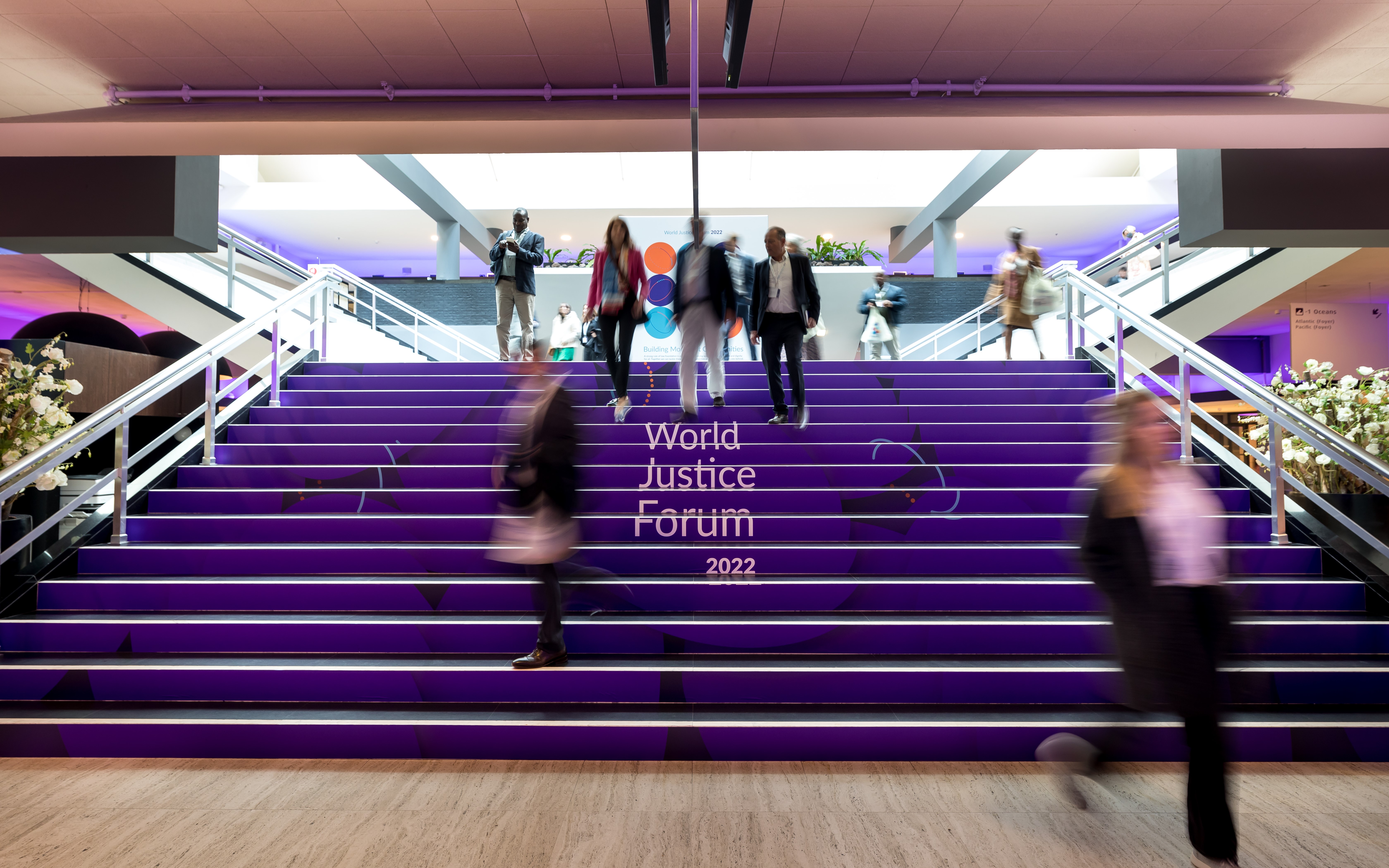
Sponsors and Partners
The World Justice Project would like to sincerely thank our sponsors and partners and recognize their critical contributions to the World Justice Forum 2022:
Co-Producing Partners
Sponsors
Supporting Partners





